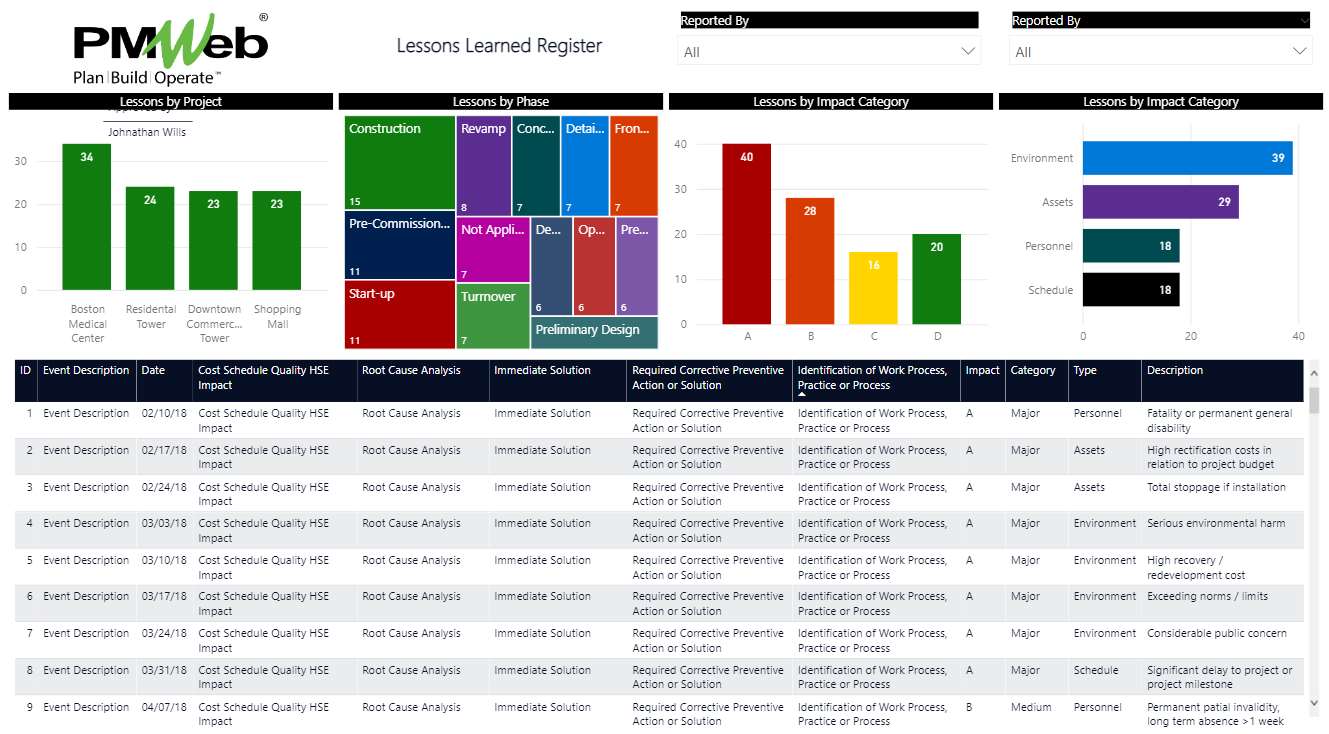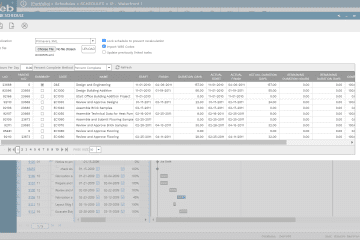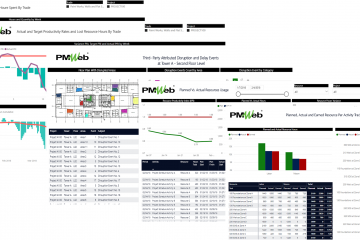The growing concerns about committing fraud on capital projects have led many public and private sector organizations to increase the involvement of their internal audit team when it comes to delivering their capital project investments. Those organizations understand the important role of the internal audit in providing an independent assurance that the organization’s risk management, governance, and internal control processes are operating effectively on their projects. They need the internal audit to provide an unbiased and objective view when it comes to monitoring, evaluating, and reporting their project’s health and performance status.
For the internal audit to be comprehensive, complete and of value, 30 audit objectives need to be performed during the project life cycle stages. Those objectives cover project management categories that relate to governance, procurement, reporting, financial, risk, communication, schedule, quality, and closeout. To achieve those objectives, the use of a reliable project management information system (PMIS) like PMWeb, which is designed specifically to manage capital projects, becomes a must and not a choice. The internal audit team needs a PMIS solution to ensure the formal implementation of project management processes to capture, store, analyze and visualize the everyday project data in a formal, organized, and effective format. This provides the internal audit team with the needed reports to monitor projects’ compliance. The internal audit team can drill down to the data source whenever this is needed.
01. Deliverables assigned to each project stage gate are formally submitted, reviewed, and approved by the project owner
The PMWeb out-of-the-box stage gate module allows the organization to define its project life cycle stages along with the deliverable for each stage. The stage gate includes details on the gate keeper, the duration of the stage, the project schedule activity that relates to the specific stage gate, and the planned and actual dates for completing the stage gate, among other general details. For the deliverables, the stage-gate also includes details on the deliverable name, responsibility, approval status, and links to the project schedule. Of course, PMWeb allows adding new fields that an organization might require for the stage gates.
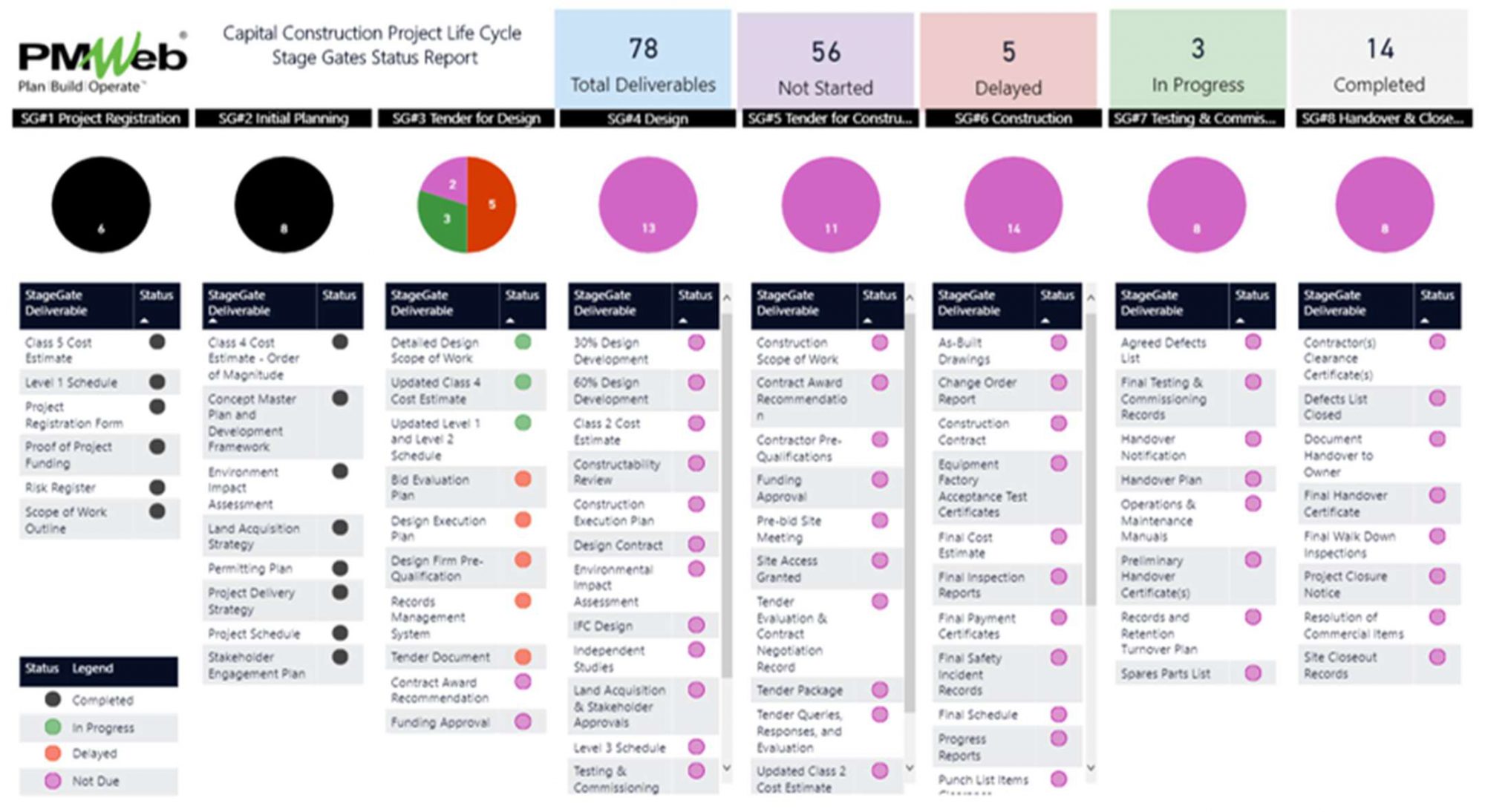
02. Qualified and registered consultants, contractors, and suppliers are invited to bid and/or get awarded project contracts
The PMWeb out-of-the-box prequalification module enables the organization to identify the different requirements that each consultant, contractor, and supplier needs to provide to be reviewed and decide if they can be approved to bid on the organization’s projects. The module comes ready with most of the queries that are needed to qualify a company such as company name, address details, and insurance details. Further, custom categories can be created to capture additional details specific to how the organization qualifies consultants, contractors, and suppliers. In addition, PMWeb custom form builder allows creating customized prequalification documents to be completed online by the consultants and contractors.
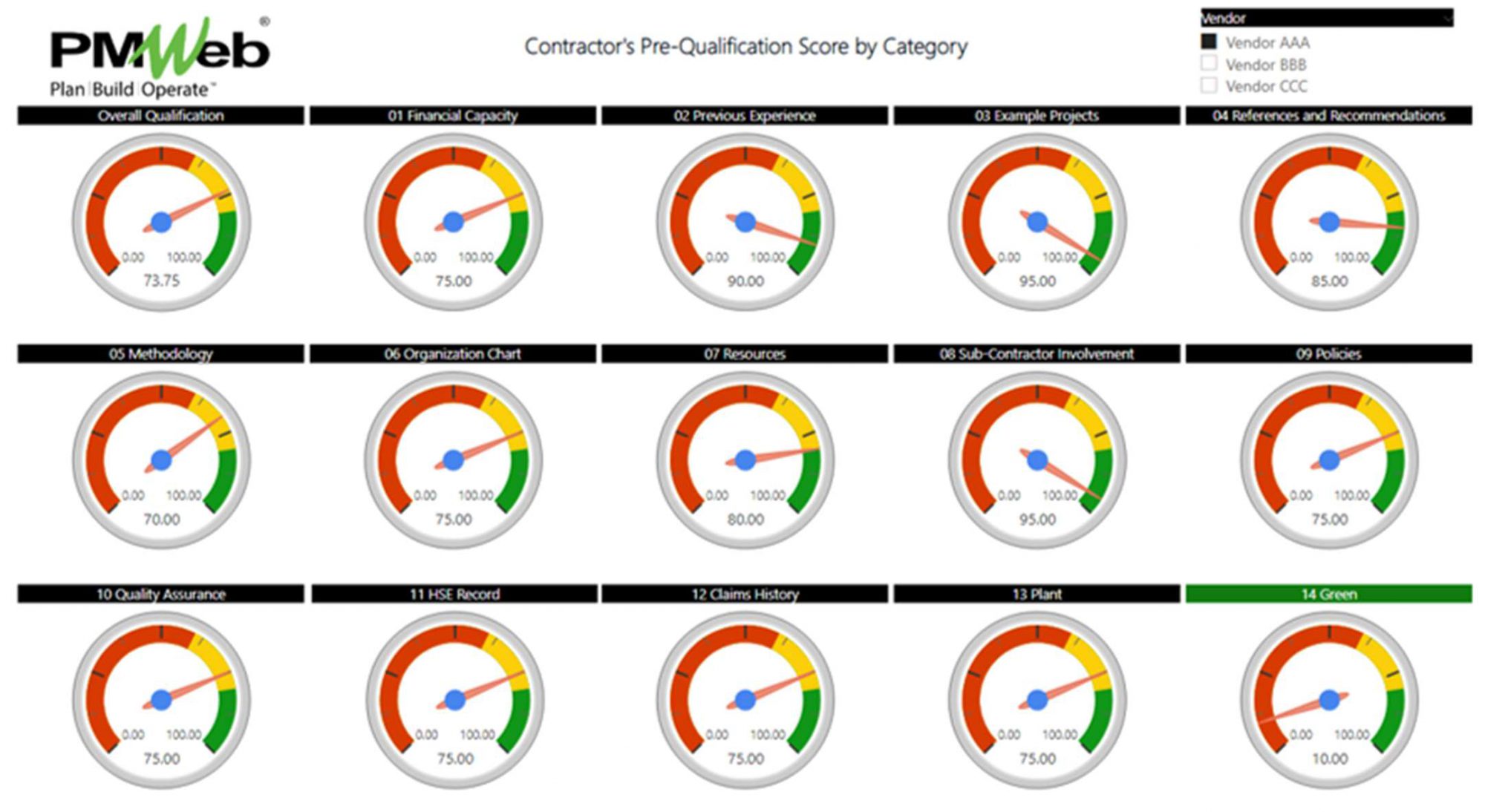
03. Consultants, contractors, and suppliers’ compliance as it relates to a contract, safety, environment, and sustainability
There is a growing trend among internal auditors to create checklists that are aligned with ISO 9000 quality management, ISO 14000 environmental management, OHSAS 18001 occupational health and safety management, and ISO
10006:2003 quality management in projects to check projects’ compliance with those standards on a periodical basis.
PMWeb custom form builder is used to create those checklists for which all items to be reviewed and checked can be added. In addition, a weight factor can be added to each item in the checklist to give a compliance weighted score. This enables the internal auditor to keep track of the compliance trend as well as compare the compliance of one project to another.
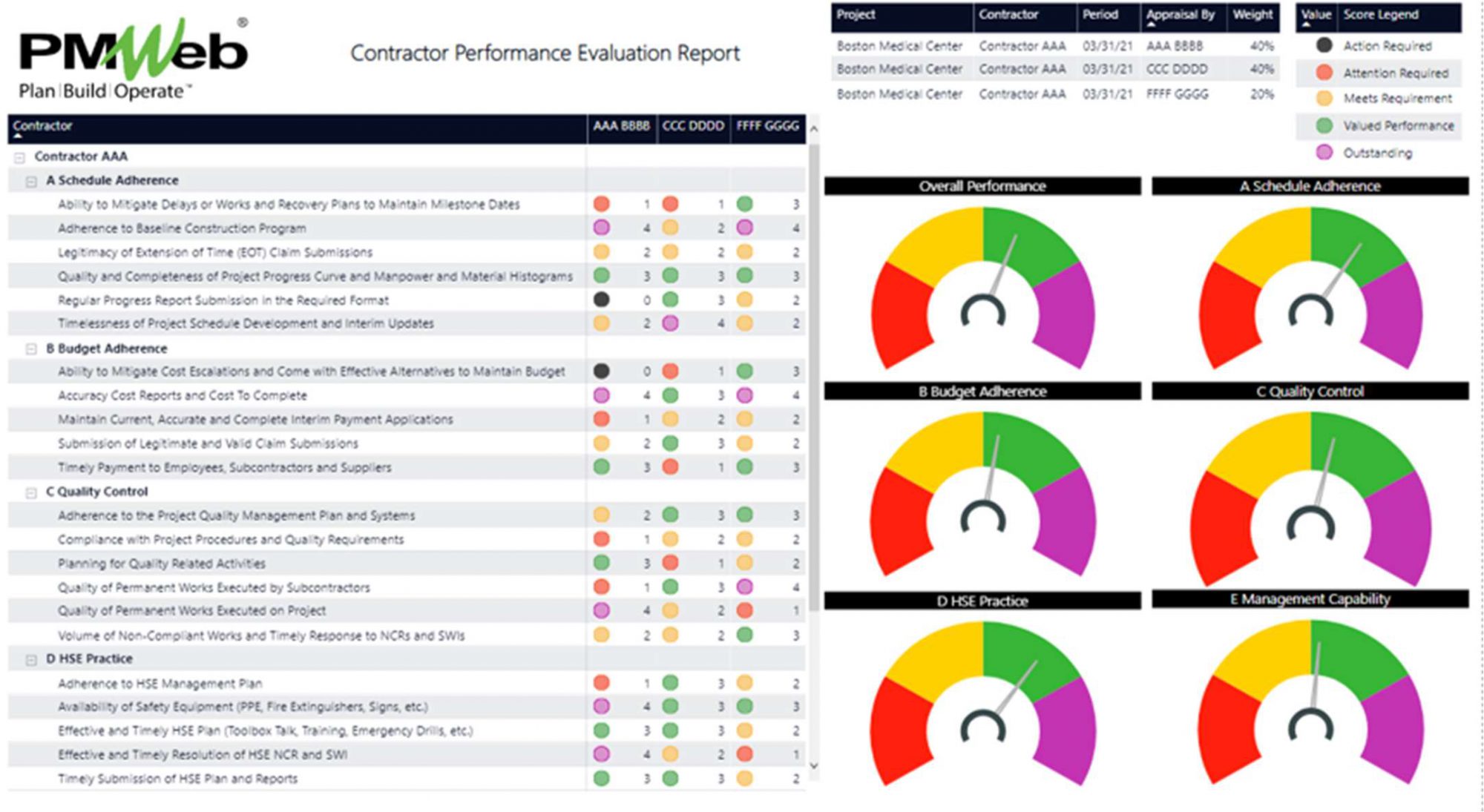
04. Project controls are working as intended and red flags are triggered automatically
When everyday data is captured in PMWeb pre-defined document templates for the different project management processes, tabular and graphical reports can be designed to report on transactions that are delayed. Different color indicators can be assigned to the performance variances depending on the range set for approved, alert and critical. The report can also be designed to filter out non-critical transactions to improve focusing on transactions that need immediate attention.
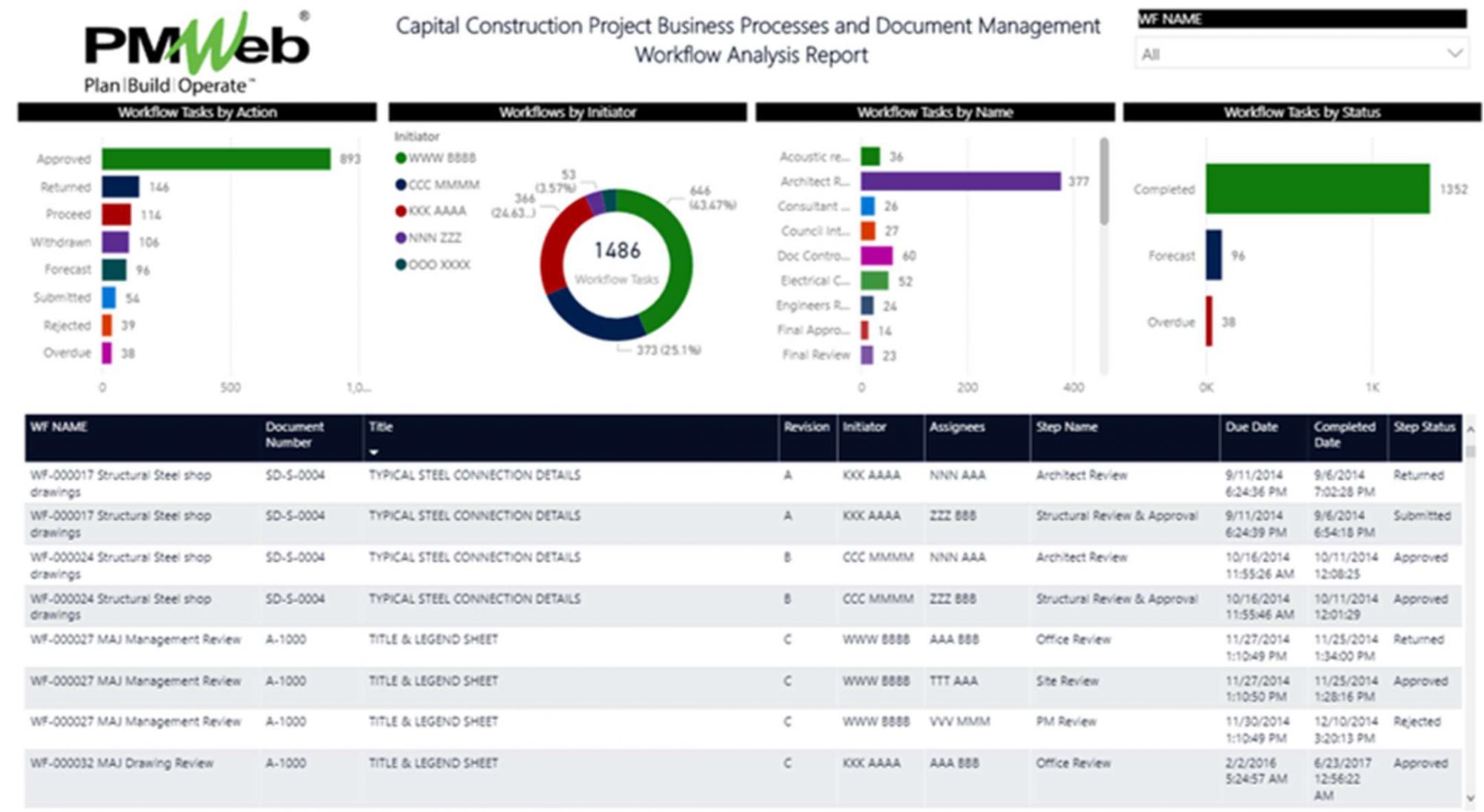
05. Single version of the truth when it comes to reporting projects’ performance and status
One of the important features of PMWeb is that it is a solution that provides a single platform to manage all pre-contract and post-contract project management processes. For each project management, forms capture all needed data as desired and set by the organization. PMWeb provides many of the forms used in engineering and construction management processes ready out-of-the-box. In addition, the PMWeb custom form builder allows the creation of additional forms that are not readily available in PMWeb. The captured data becomes the basis for creating tabular and graphical reports as well as project, program, and enterprise dashboards. All those reports and dashboards use the same database to assure a single version of the truth when it comes to reporting projects’ performance and status. The layout and content of those reports and dashboards are fully customizable to fulfill the organization’s reporting needs using their branding colors and logos. The dashboards can be linked to external applications such as construction cameras to provide live streaming of the project’s status.
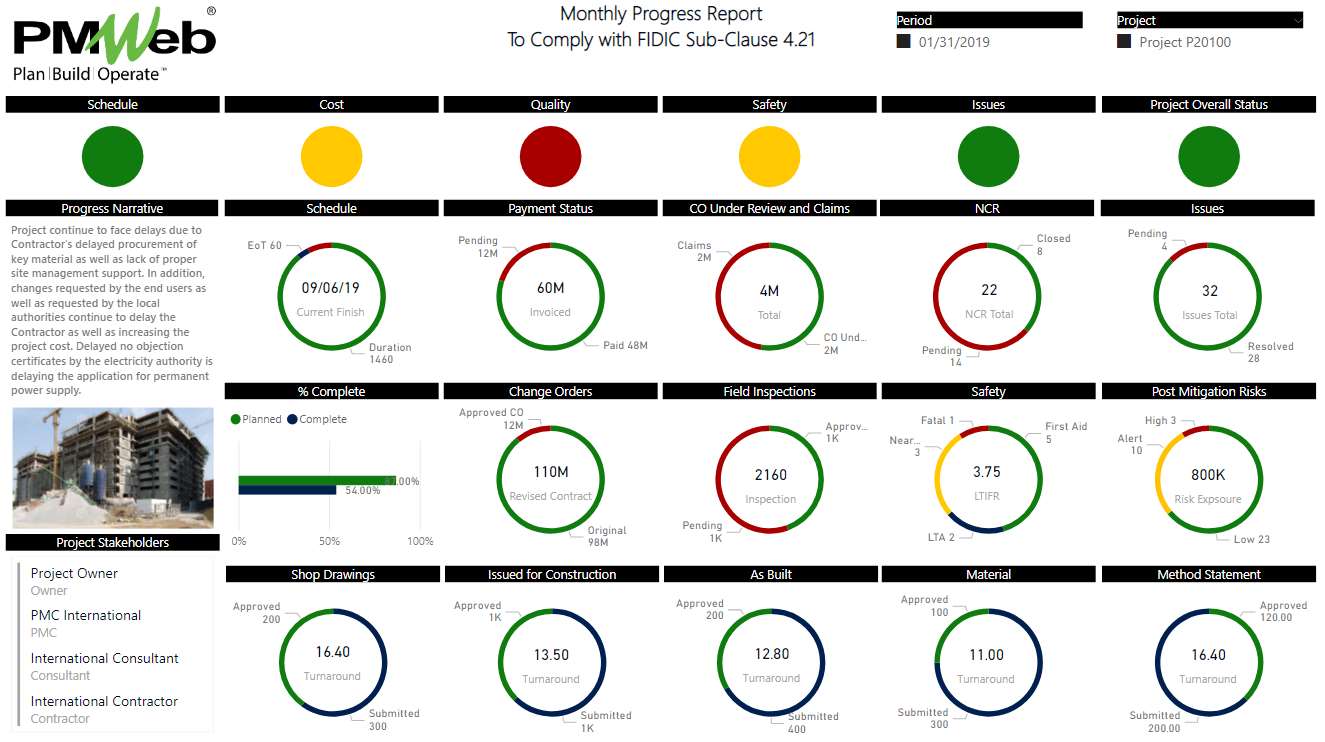
06. Financial transparency as it relates to project budget, contingency usage, awarded contracts, change orders, and invoices for completed works
PMWeb comes ready with all the forms needed to capture projects’ cost details to ensure financial transparency. The out-of-the-box ready-to-use modules include cost estimating, budget, budget adjustments, commitments, change orders, progress invoices, payments, and cost worksheets among many others. To ensure financial transparency, the first task to be done is to define the cost breakdown structure (CBS) in the format that an organization wants to report its project’s financial status. PMWeb allows the creation of an unlimited number of cost levels to match the desired cost granularity.
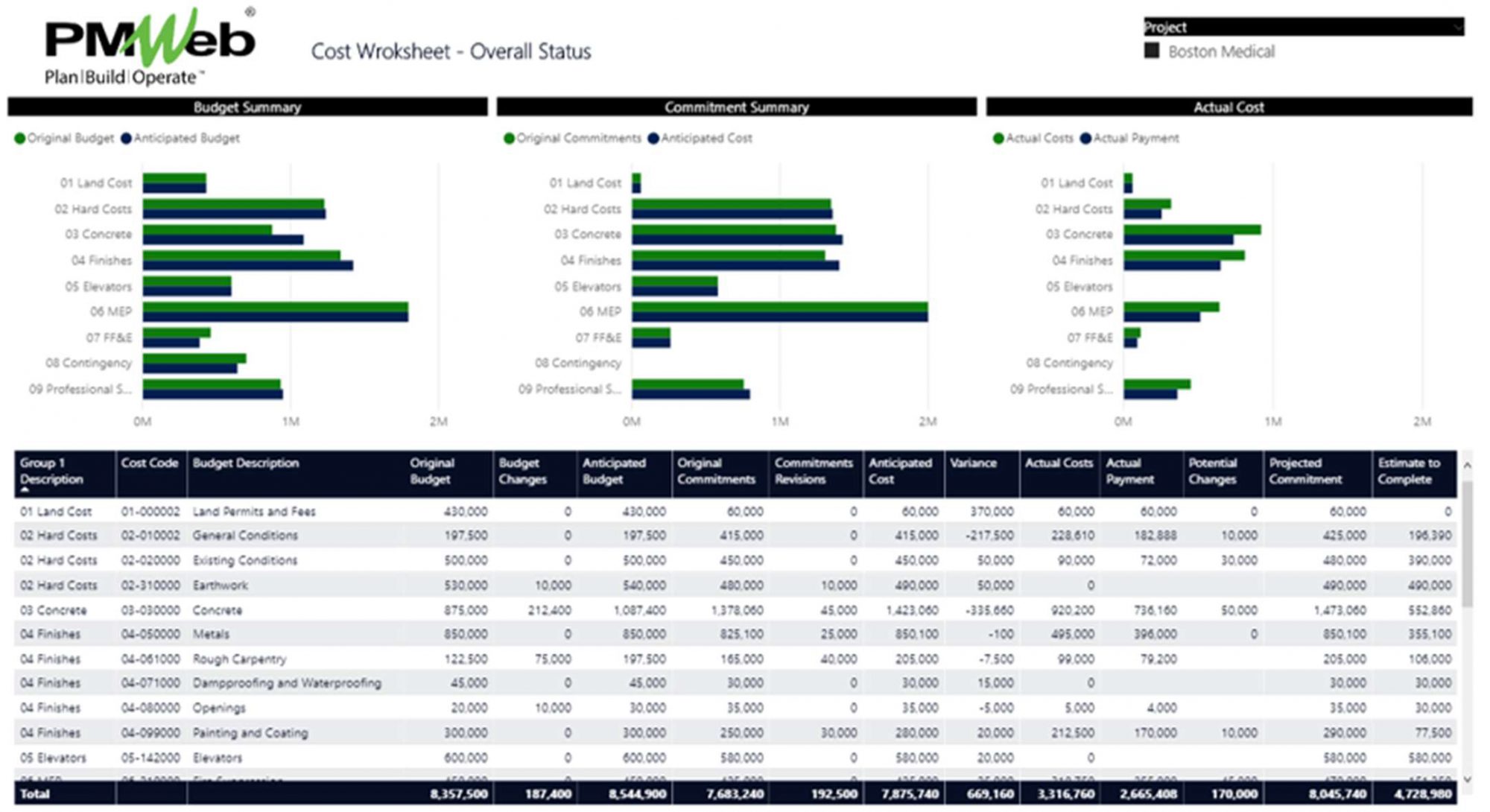
07. No non-authorized transfer of budget funds from one cost center to another
All budget transfers must be completed using the PMWeb Budget Request form. Access to this form will be limited to those who have been authorized by the organization to do budget transfers. To ensure that there is no non-authorized transfer of budget funds, the approval of this form needs to be linked to a workflow. PMWeb visual workflow allows the user to map the different steps needed to submit review share and approve the budget transfer. PMWeb visual workflow also adds conditions and branches to map the different approval levels needed to approve a budget transfer. Those could be relevant to the transfer amount, reason, or other factors. Those can be conditions that can be set to “All” to happen or “ANY” could happen.
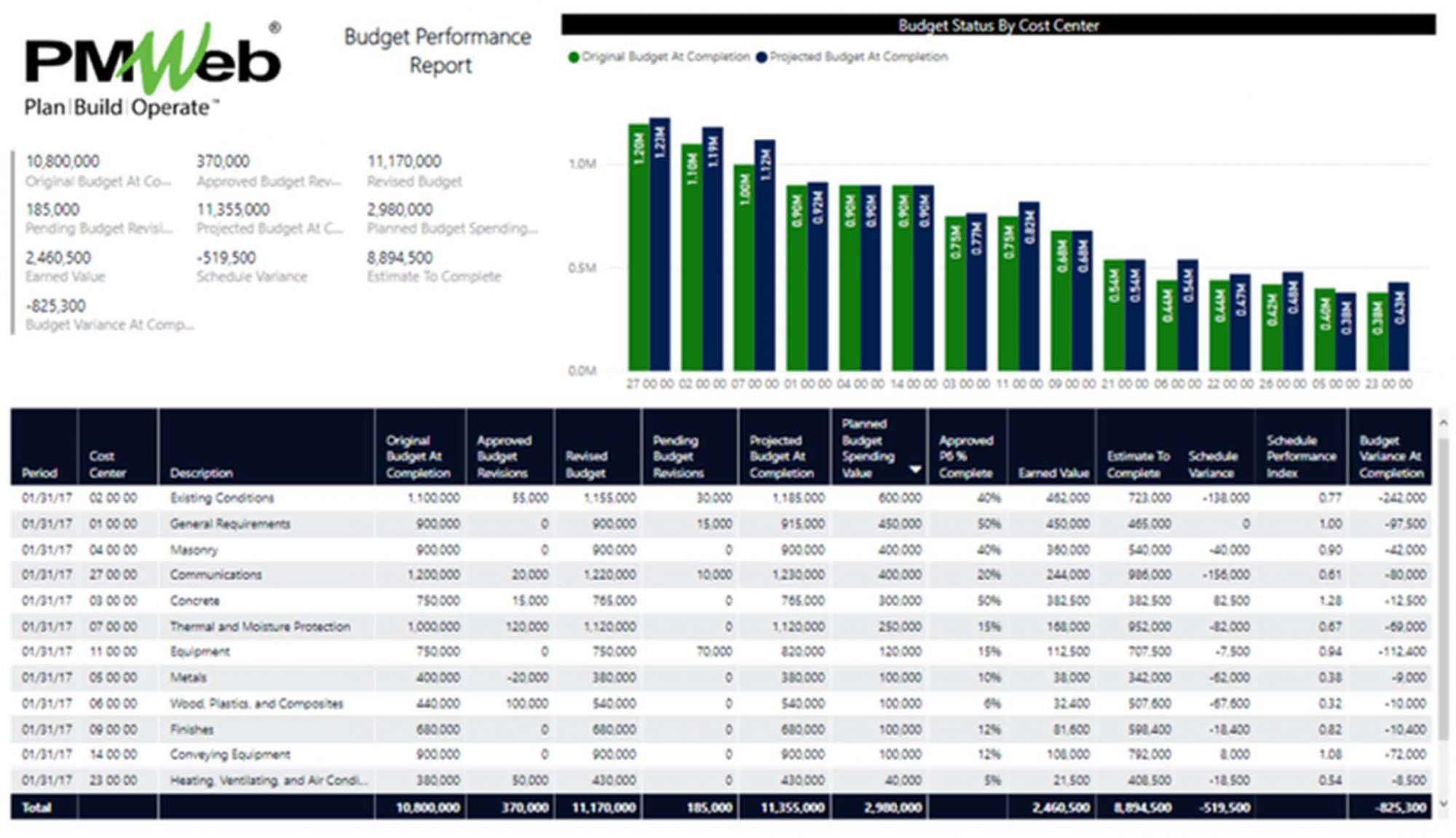
08. Contingency spending is authorized by the project owner
Contingency spending is like PMWeb budget transfers, but the transactions is limited to the contingency cost breakdown structure (CBS) level. Conditional workflows ensure that contingency spending is authorized by the project owner. PMWeb reports on the usage of the project cost contingency and schedule buffer.
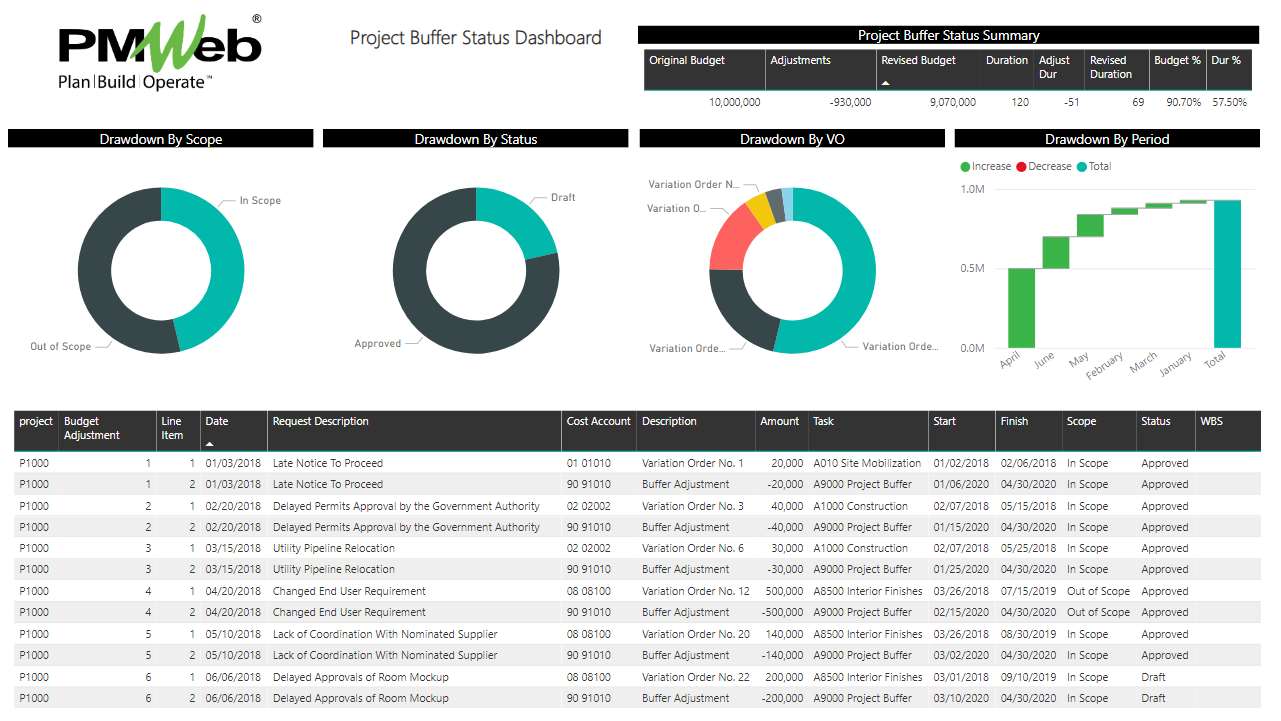
09. Fair and proper commercial bid analysis for technically qualified bidders
PMWeb procurement module allows for the commercial bid analysis where the price from each bidder will be displayed against the approved project cost estimate. An added workflow to this module ensures fair and proper commercial bid analysis for technically qualified bidders.
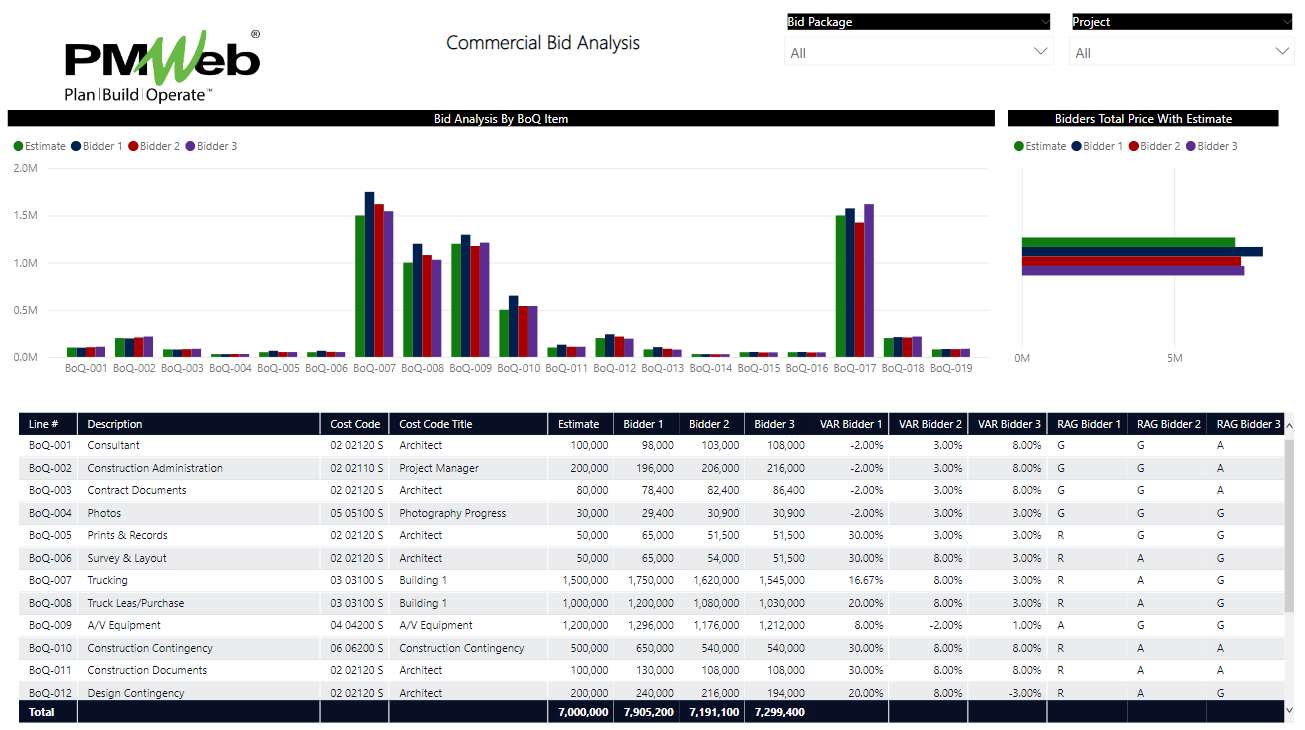
10. No erroneous or unsupported change orders
The PMWeb change management module captures all change orders. The PMWeb change order form has the data that must be provided for every single change order. Additional custom fields can be added to meet the organization’s requirements. Each change order should have all supportive documents attached to it. In addition, all other relevant PMWeb records need to link to the change order. The workflow ensures that each change order is submitted, reviewed, and approved by the designated team members. PMWeb report writer can design any output report needed to report on change orders to ensure that no erroneous or unsupported change orders are processed.
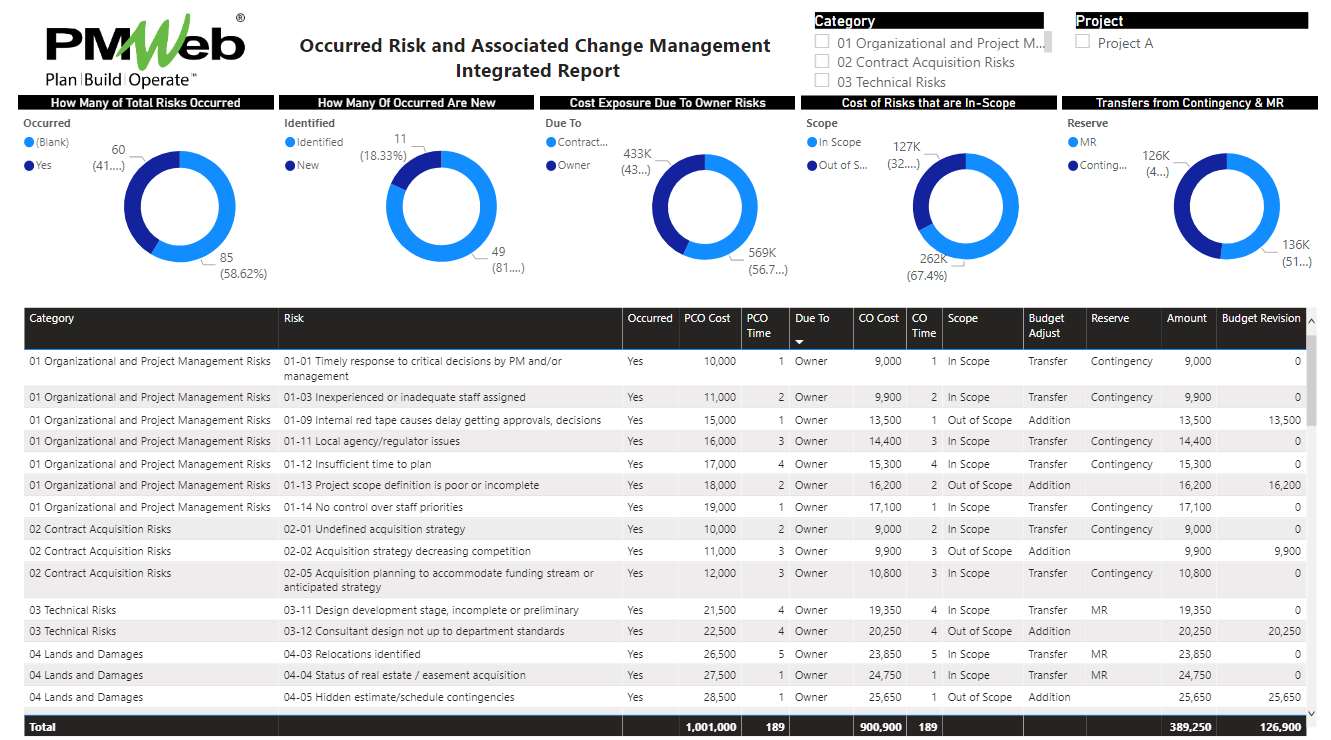
11. Reported progress invoice is aligned with schedule reported performance
PMWeb scheduling module allows developing and maintaining the project schedule as well as importing the project schedule from Oracle Primavera P6 or MS Project. This enables the assignment of the relevant project schedule activity to the bill of quantity (schedule of values) line item. This ensures that the reported progress invoice is aligned with the schedule’s reported performance.
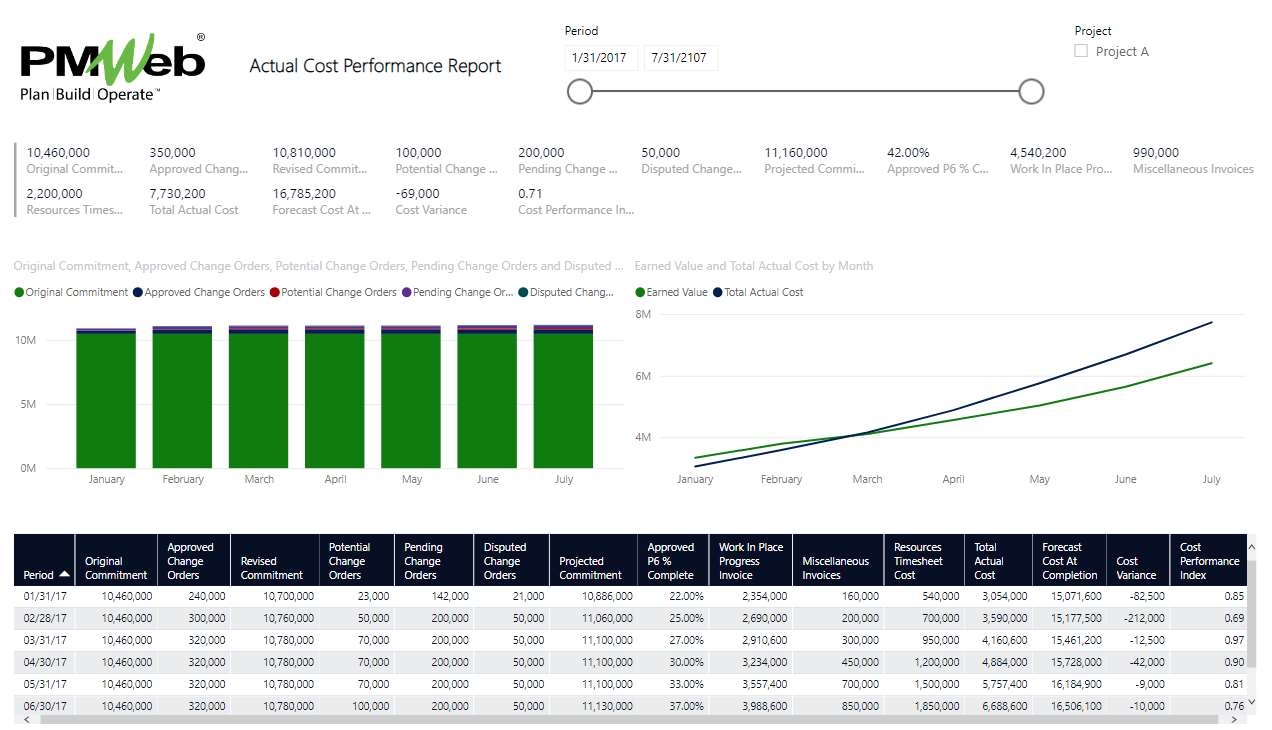
12. Reported progress invoice is aligned with the earned budget
PMWeb Forecast Module ensures that the reported progress invoice (or Actual Cost) is aligned with the earned budget (or Earned Value). PMWeb report writer allows the organization to create a tabular and graphical report to display the earned value analysis status of the selected project.
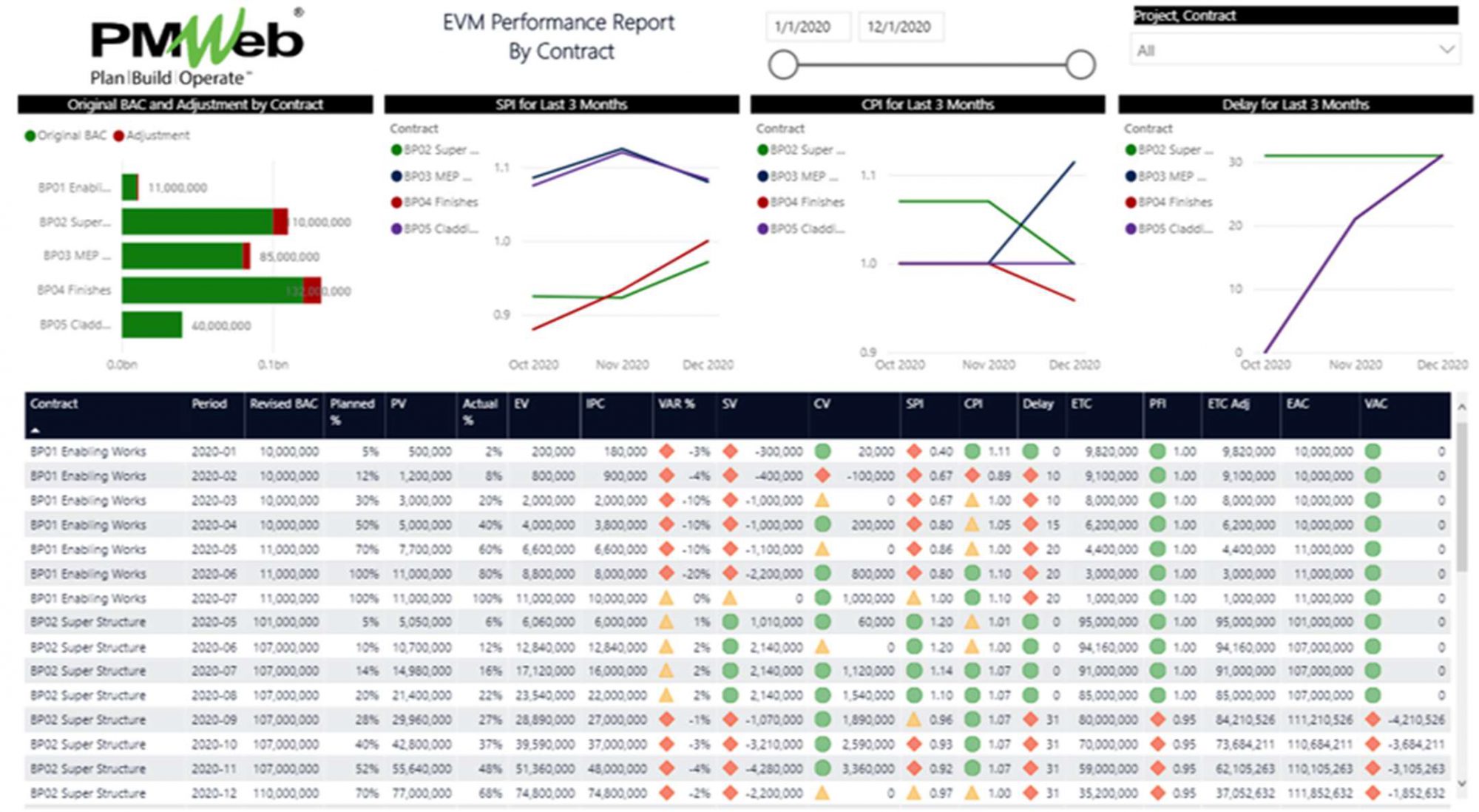
13. Payments made against approved progress invoices to consultants and contractors are used to cover expenses incurred on the same project and were not used for other projects
One of the recommended practices is to have a checklist as an integral part of each progress invoice. The checklist includes entries to be completed by the project-approved subcontractors and suppliers where they need to confirm that they have received the payment for the last approved progress invoice. This checklist will be done using the Checklist tab in PMWeb, which can be added to most PMWeb forms.
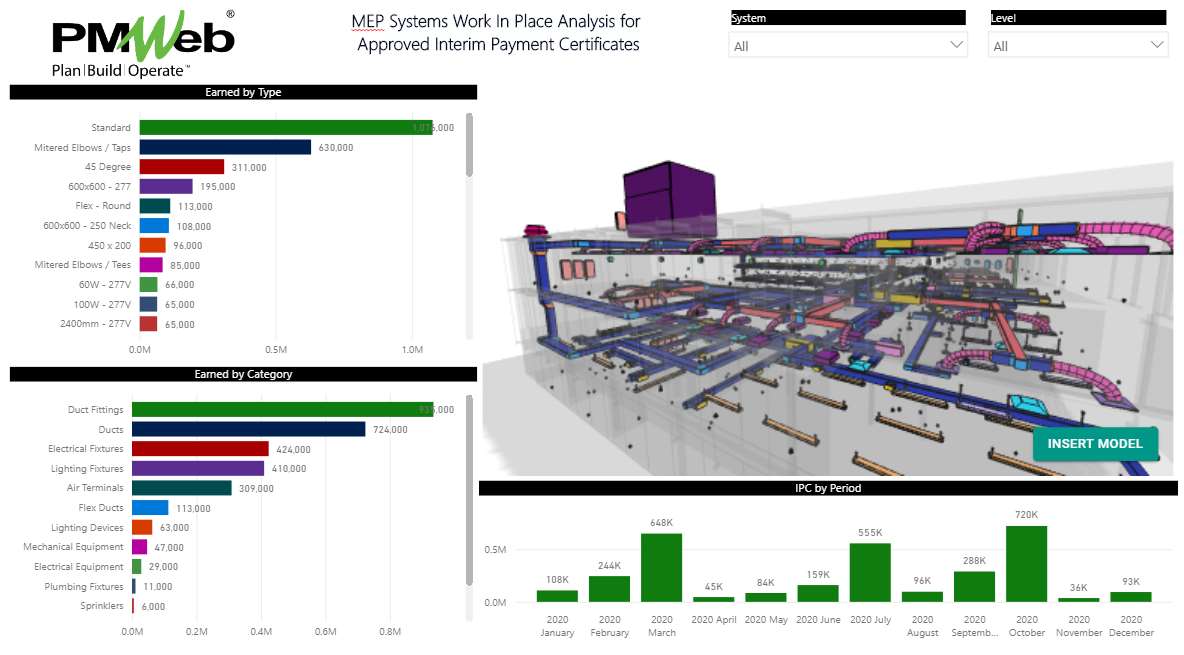
14. Proper value engineering workshops were conducted as planned and associated cost savings are reflected in the approved project budget
PMWeb custom form builder allows designing the forms needed to enforce the formal processes needed for value engineering. Those include ideas generation, proposals advantages, and disadvantages, and value engineering proposals. In addition, PMWeb default modules such as cost estimates and meeting minutes support the other processes needed for value engineering. The information captured in those forms becomes the basis for monitoring, evaluating, and reporting the value engineering implementation.
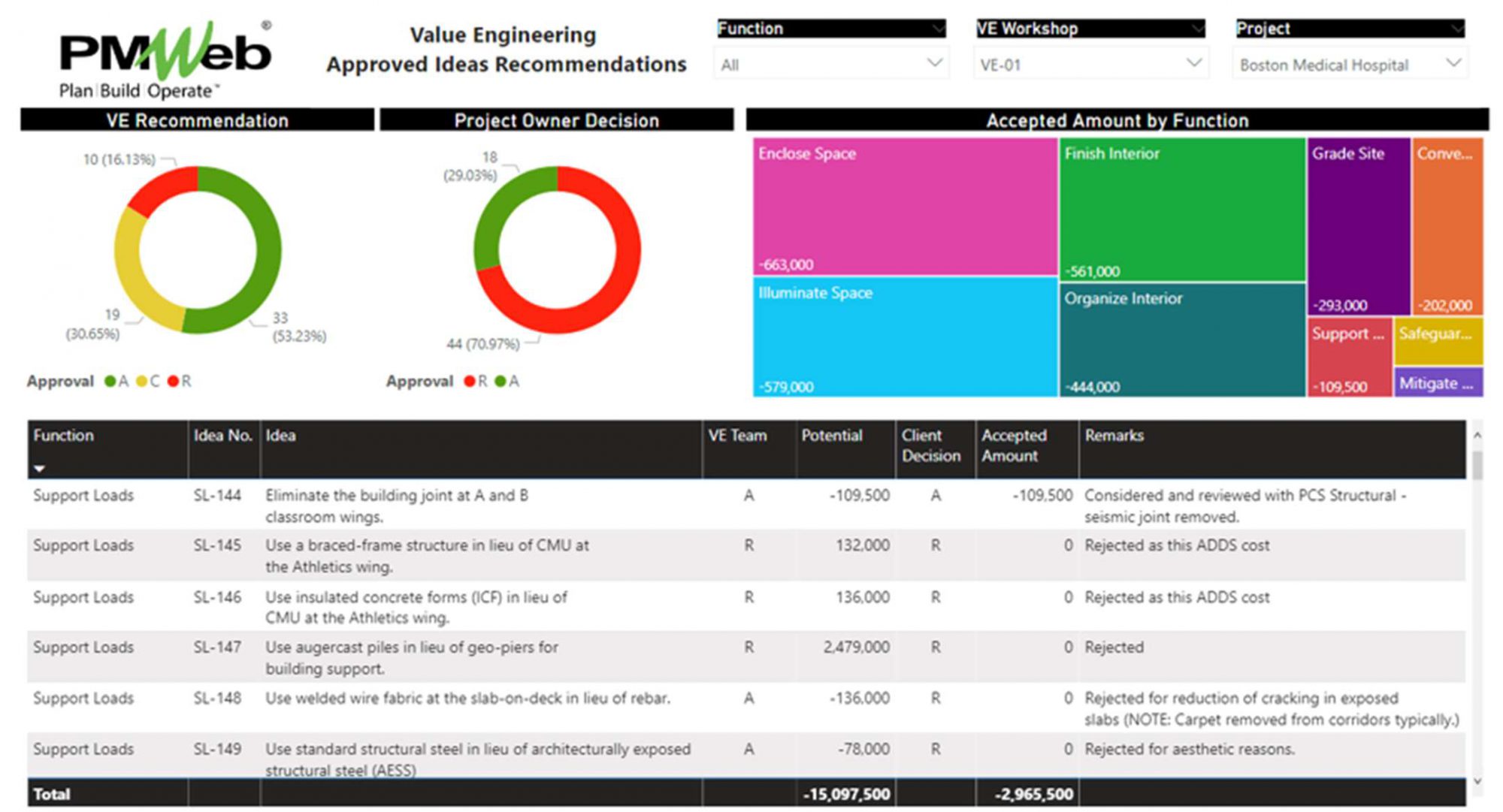
15. Risk register and all approved risk response actions are implemented
PMWeb provides the option of using the default risk register module or using the custom form builder to create the forms needed to implement the risk management process. For each risk identified, the customs form can be designed to capture the details of the risk particulars, assessment, and approved response action. Similar to other PMWeb modules, all supportive documents can be attached to the form, and relevant documents are linked to the form. The workflow captures the steps for submitting the reviewing, reviewing, and assessing the risk and approving the risk response. The form field security level can limit access to each field based on the approved permission list. This data becomes the basis for developing and maintaining the project risk register. The register provides details of all risks, assessments, and approved risk response actions. This becomes a real-time report showing the latest status of all project risks.
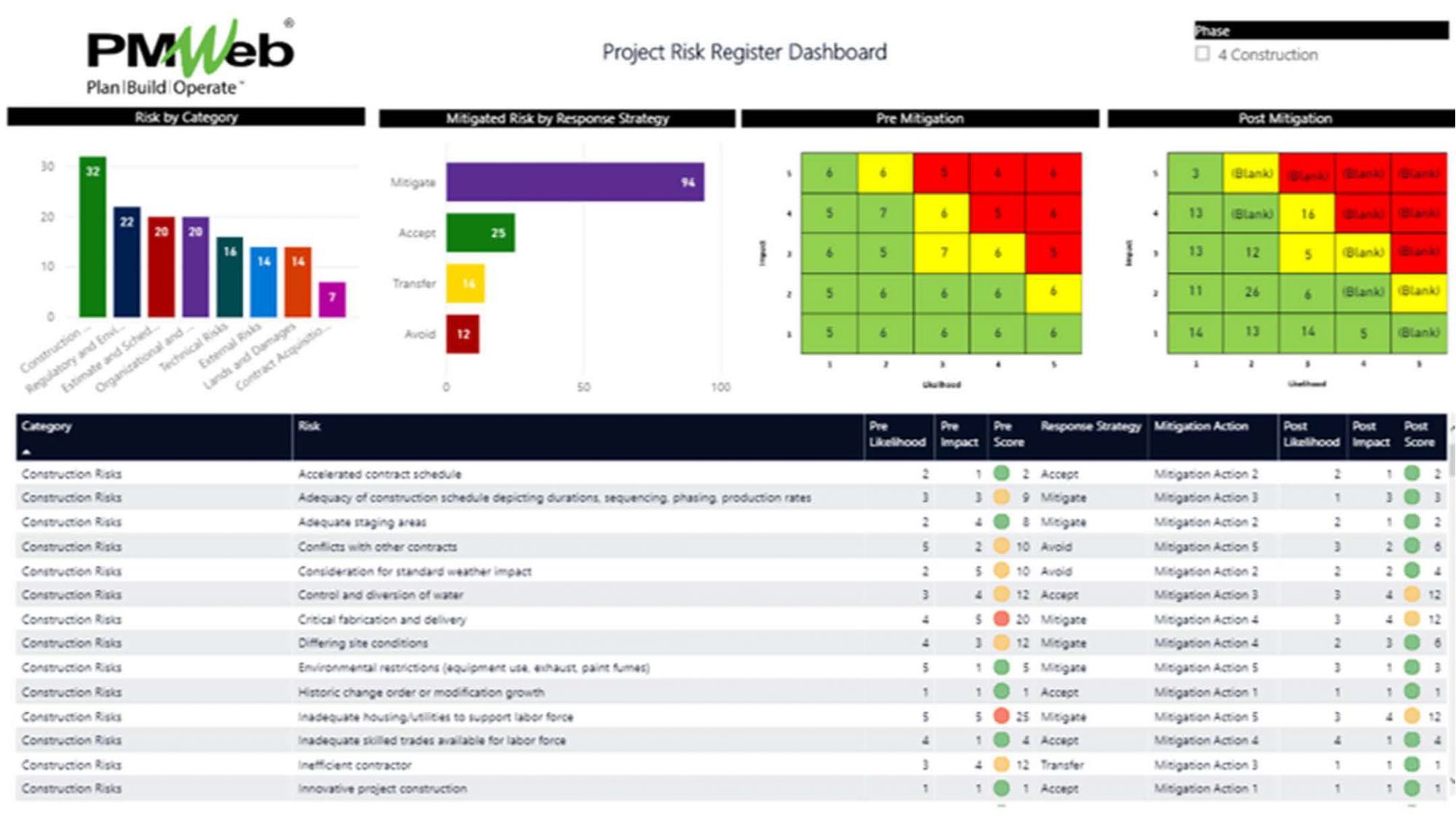
16. Early Warning Notification (EWN) process for all events that could impact the project
The Early Warning Notification (EWN) is a process that requires all project stakeholders to formally notify each other of an early warning of certain types of events that could. If they happen, it details whether this will increase the project price, delay the completion date, and/or impair the performance of the works in use. For some, the EWN is considered a proactive project risk management process. PMWeb custom form builder allows creating the EWN form to capture all EWNs. Similar to other PMWeb modules, EWN allows attaching all supportive documents. The workflow option allows for creating multiple workflow variations depending on the attributes assigned to the EWN to ensure that it gets transmitted to the right project team members for review and approval without wasting the time trying to guess who should be involved.
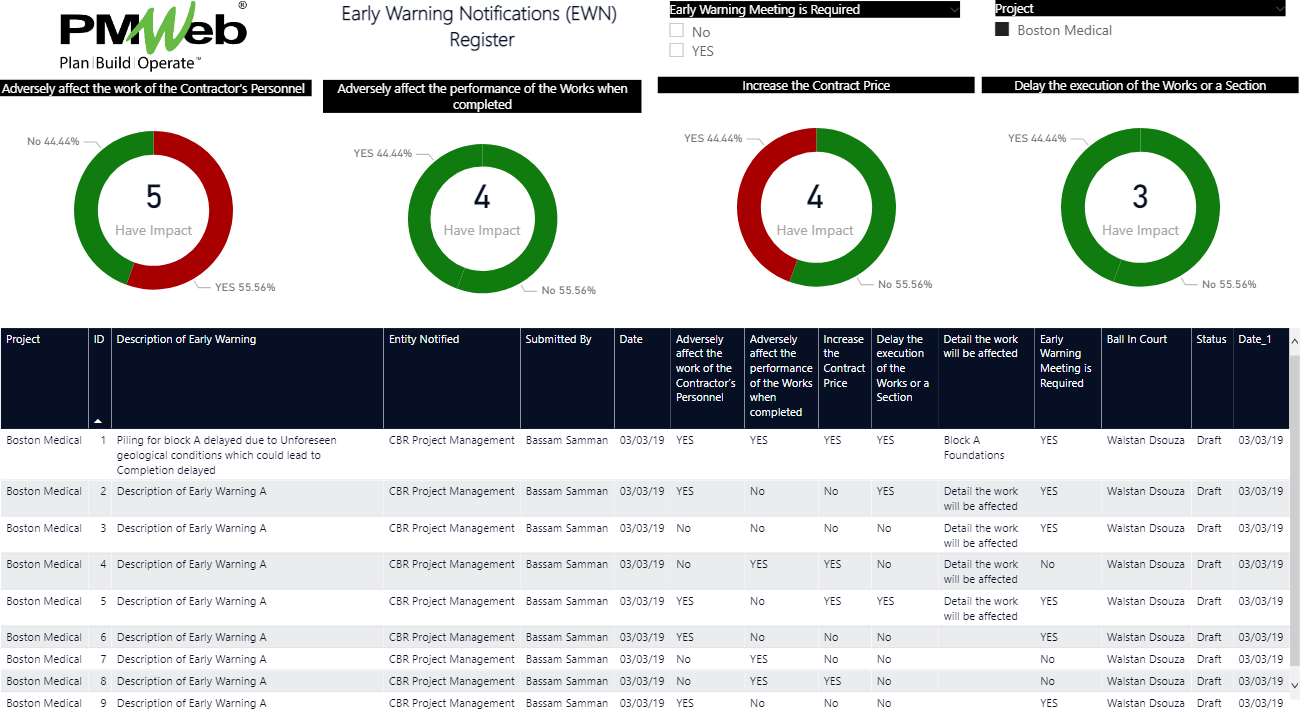
17. Issues log and all approved resolutions are implemented
The PMWeb Custom Form Builder helps to create the issues form to capture the details of who has raised the issue, the proposed resolution and if implementing the resolution has solved the issue. The PMWeb report writer creates the issues log which displays the needed issue fields as well as displaying color indicators to provide an alert on the criticality of the issues. This helps the organization to ensure a real-time updated issues log that highlights the status of all proposed issue resolutions.
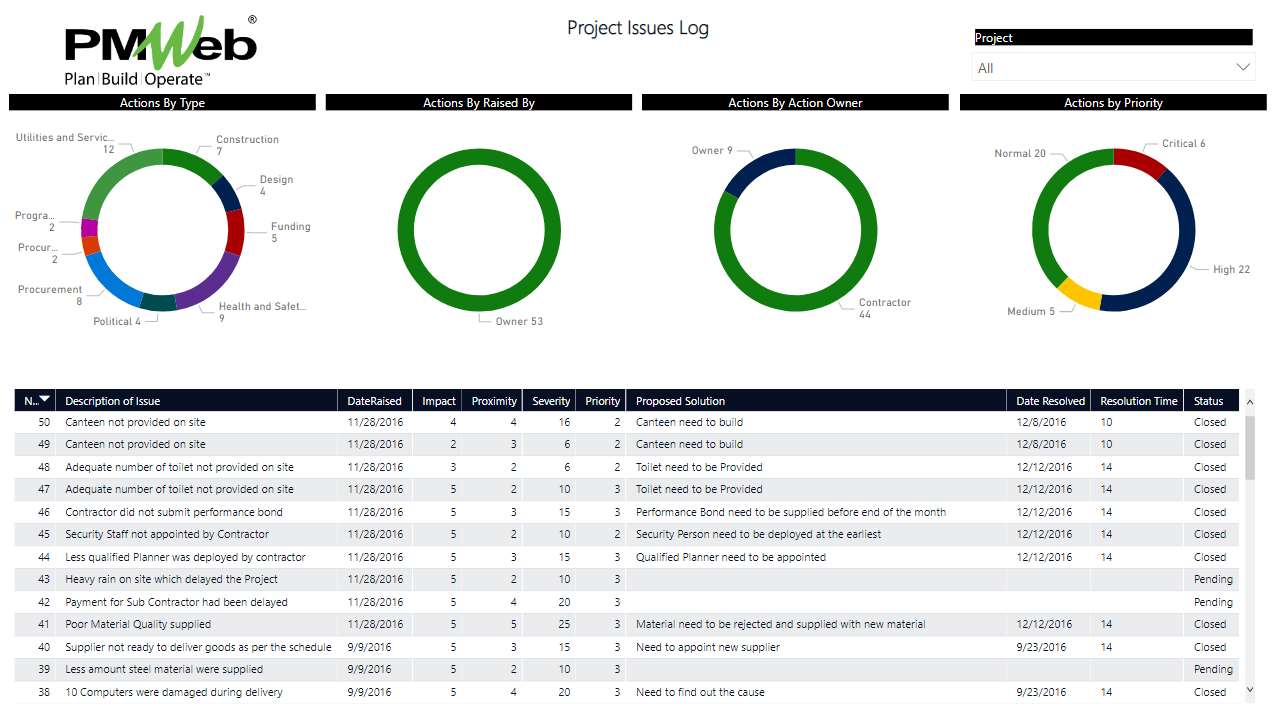
18. No excessive or delayed closure of RFIs that could result in change orders
PMWeb default request for information (RFI) module will be used to capture all details of project RFIs. This include the query, proposed solution, and answer. In addition, it provides details of the RFI that could impact the project scope, cost, and/or schedule as well as the project schedule activity details. The RFI module allows attaching documents, linking records, and having a workflow to submit, review and approve. PMWeb report writer prepares the RFI log and other tabular and graphical reports that could be needed to report on the status of RFIs to ensure that there is no excessive or delayed closure of RFIs that could result in change orders.
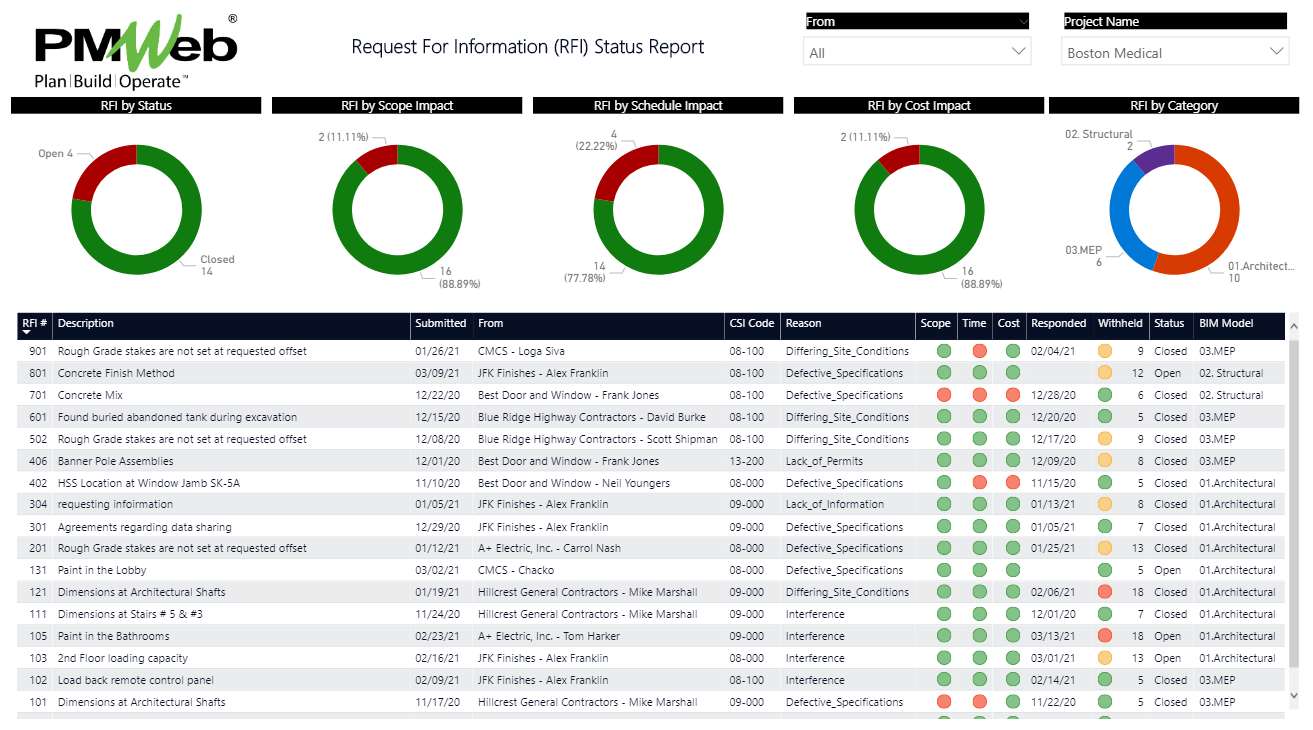
19. Meeting minutes are documented and being managed in an effective method with no long pending meeting business items
PMWeb meeting minutes module allows capturing all types of project meetings including progress reviews, safety, and health, quality control, pre-bid and award, kick-off, value engineering, and stage gate reviews among many others. PMWeb report writer allows for creating customized tabular and graphical reports to provide the needed information to ensure that meeting minutes are being managed in an effective method with no long pending meeting business items.
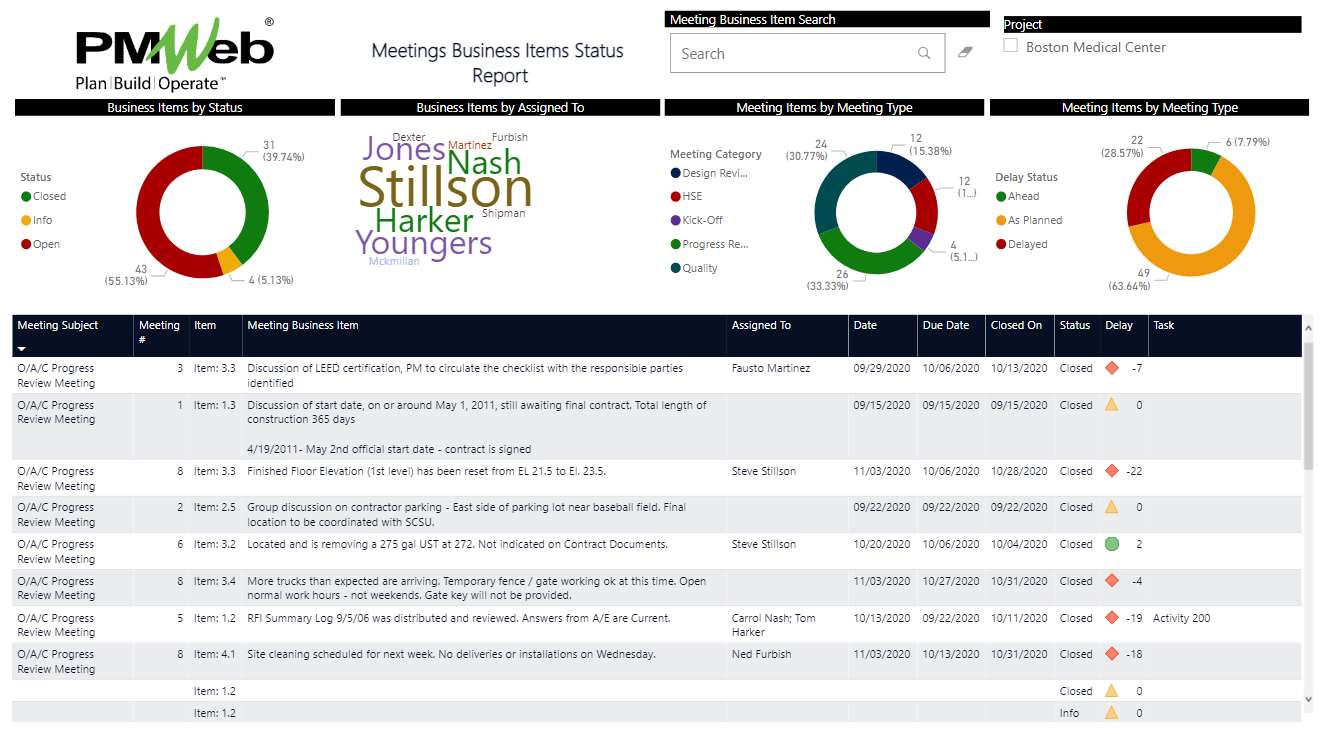
20. Complete project documentation of all drawings, specifications, communications, and emails among many others
PMWeb document management module allows the organization to map its exact filing system structure into PMWeb. It can be used to create folders and subfolders to upload project documents such as drawings, specifications, communication, pictures, and videos among many others. For each uploaded file, attributes can be added to better define the documents and expedite the file search process. Similar to other document management systems, PMWeb allows document versions, download documents, and checkout/check-in documents. Documents can be viewed online as well as redlined to add comments and shapes.
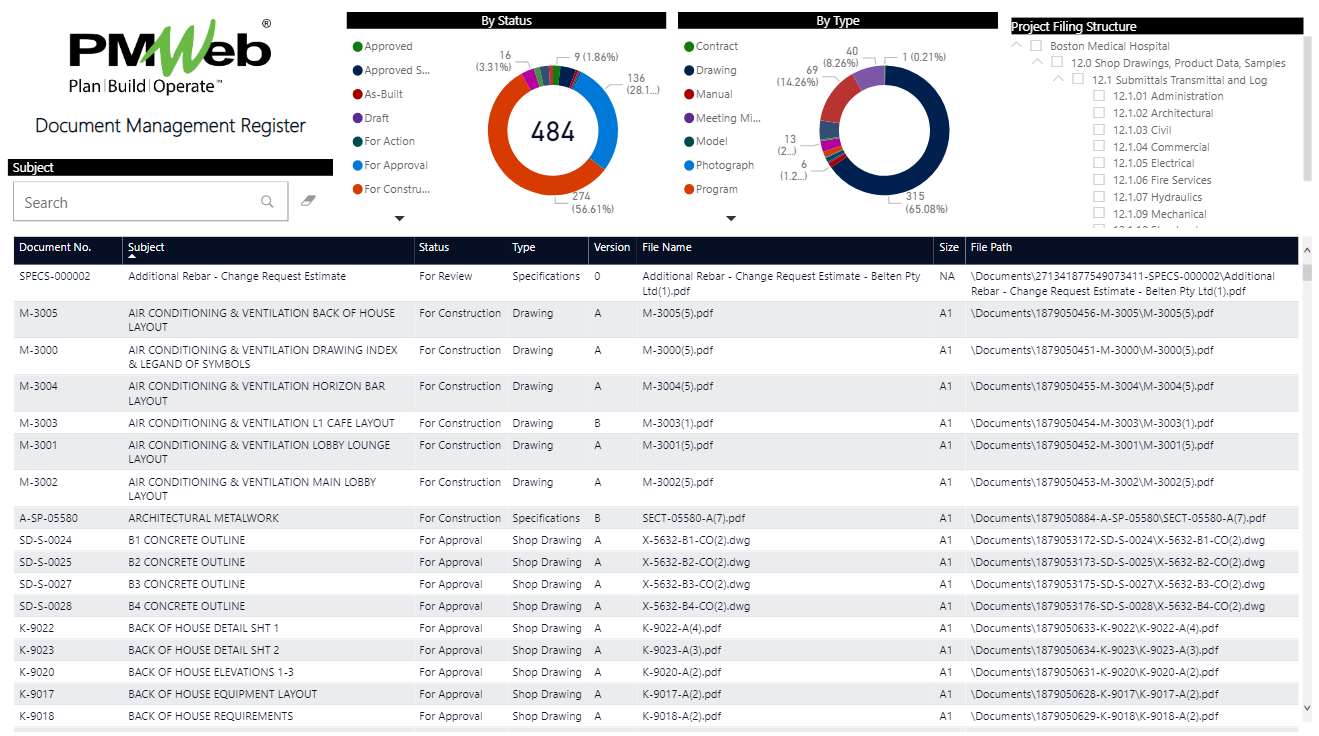
21. Latest versions of all project contract documents are documented and used by all project stakeholders
It is common in every construction project that drawings get revised and updated due to changes and actual site conditions. It is important to maintain a register of all those documents and the revisions. PMWeb drawing register allows adding all project contract documents including drawings, specifications, bill of quantity, and contract agreement. It also allows keeping the details of all revisions for each document. The original document can be attached to the record entry.
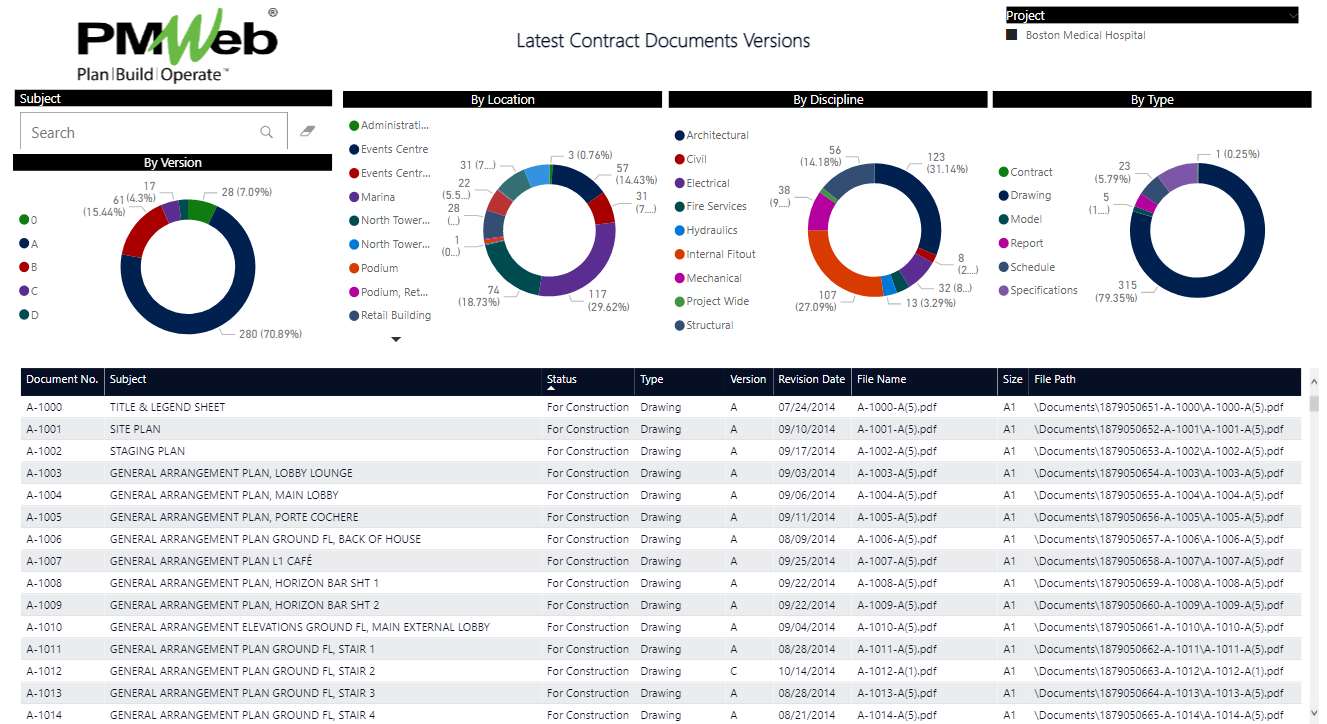
22. Claims log is updated and has all supportive documents to defend the organization
Similar to all other custom forms detailed earlier for Risk, Early Warning Notification, and Issues, the PMWeb custom form builder helps to create a form to capture the particulars of all claims. The form includes details on the contract clauses that the claim relates to, a description of the claim, and a quantification of the claims, among others. All supportive documents can attach to the claim and all relevant records can link to the form.
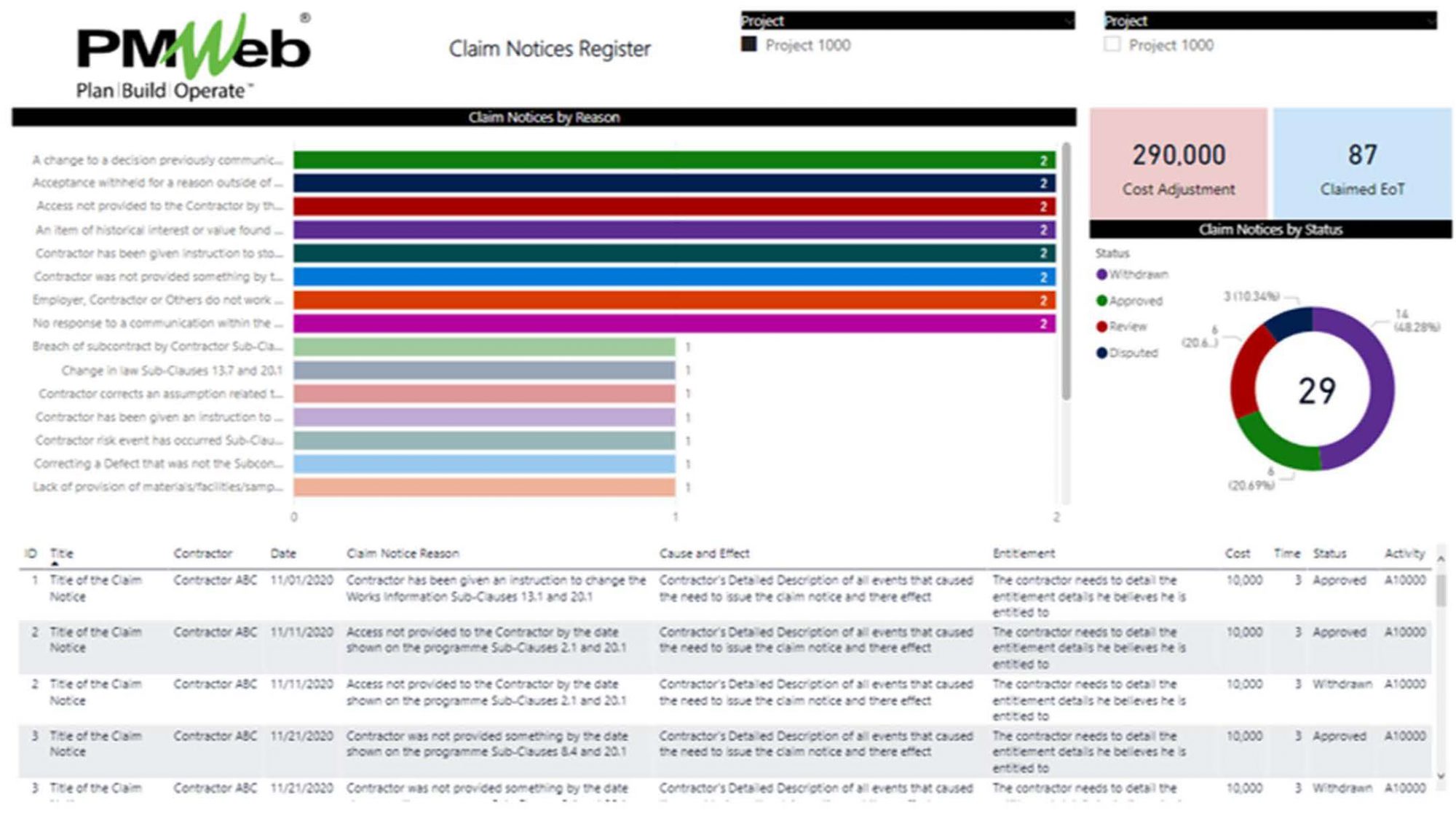
23. Formal review and approval of the project’s baseline schedule to ensure compliance with the contract requirements
There are several best practices to review and analyze the project baseline schedule. It is recommended to create a form that captures the details of the schedule review and analysis. The PMWeb custom form builder helps create this form for which it itemizes all items that the project schedule needs to comply with. The checklist reflects the organization’s knowledge and experience in reviewing project schedules. For each checklist item, it is recommended to create a text note field to add the comments made by the reviewer.
When the form is completed, the organization needs to attach the detailed project schedule report saved in PDF file format to this review form. There could be more than one project schedule report to detail the critical path, resources histogram, and successor and predecessor report, among others. The workflow for submitting, reviewing, and approving the project schedule submission should be part of this form. This process ensures there be a formal review and approval process of the project’s baseline schedule to ensure compliance with the contract requirements.
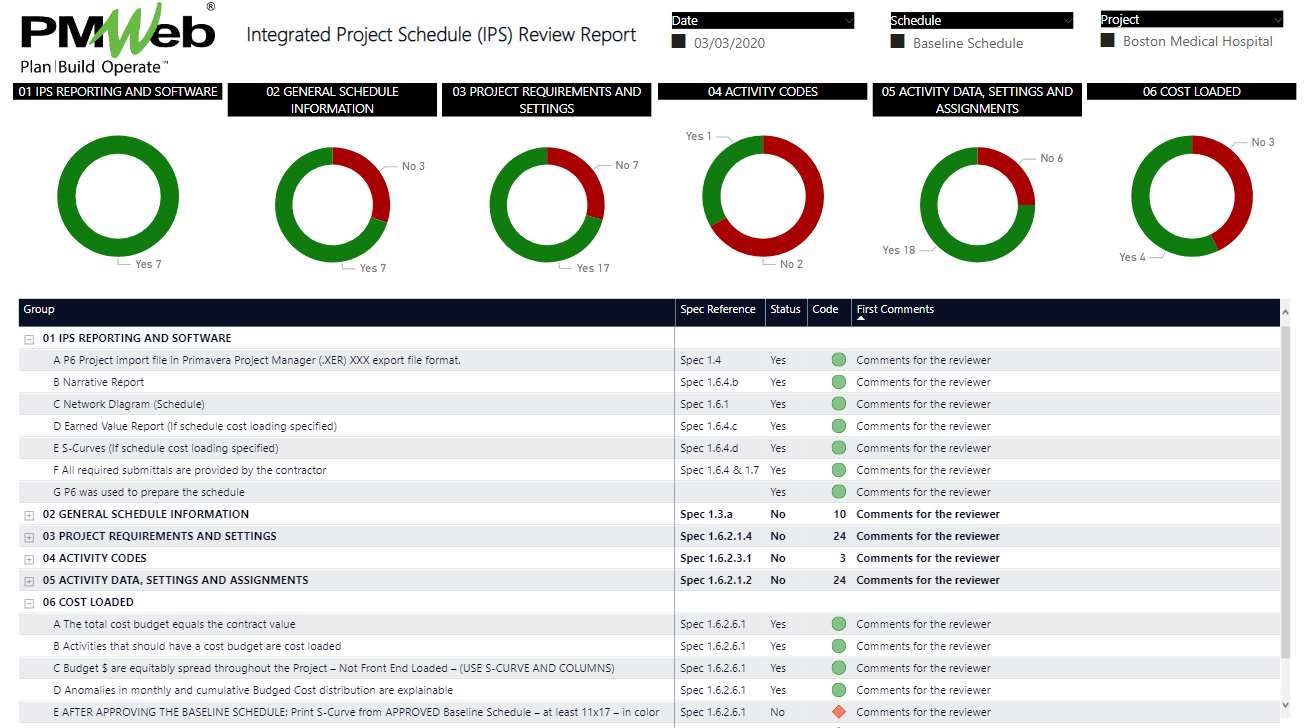
24. No non-authorized change in project schedule activities duration, relationships, or constraints
It is highly recommended to use the same processes for reviewing and approving the project baseline schedule to a formal review and approve all schedule revisions. In addition, the PMWeb scheduling module allows creating reports to report on changes between the imported schedule updates.
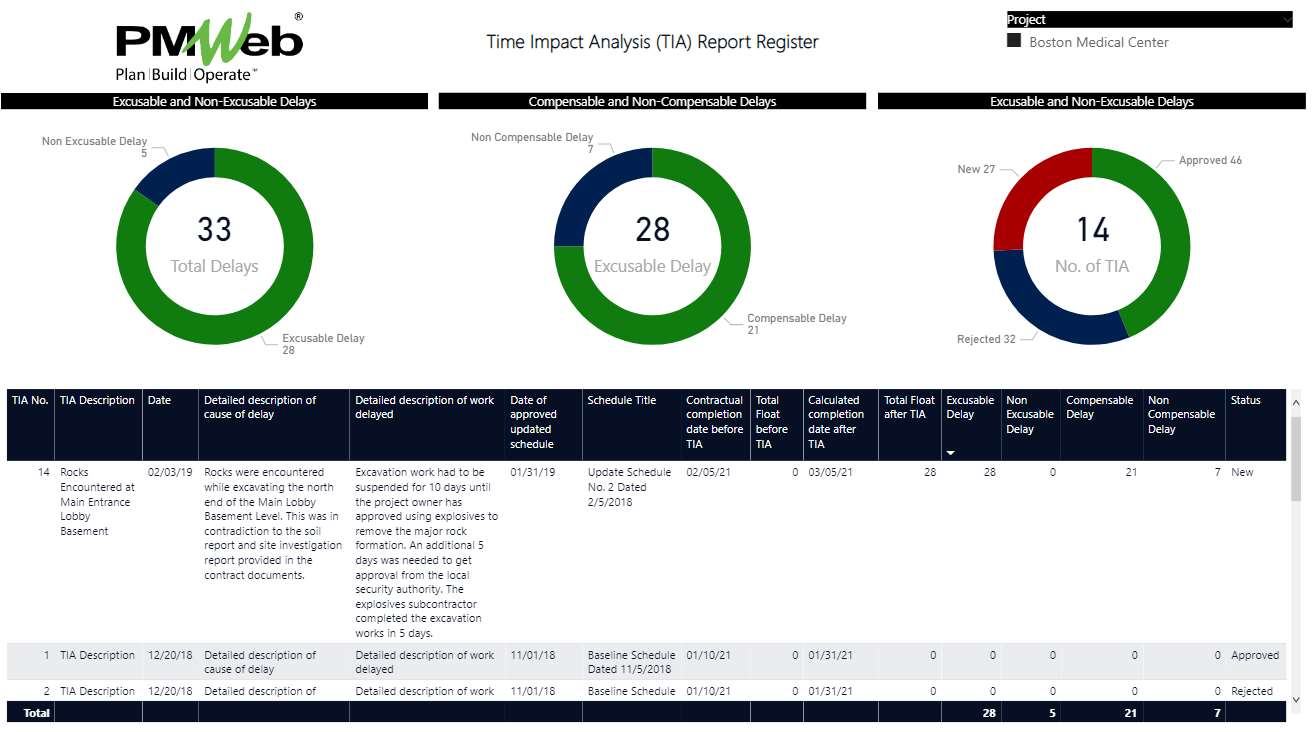
25. Proper documentation and analysis of all-time extensions requested by contractors and consultants
Delay analysis requires capturing complete details of the relevant events that caused the delay. It requires analyzing if the delay is excusable or not and if excusable does it allow for compensation or not. The analysis should also determine if the delay is a concurrent delay or not. Regardless of the analysis level of detail, it is recommended to create a custom form in PMWeb to capture the complete details of this delay. All supportive documents need to be attached to the delay form. More importantly, the PMWeb records that are related to those delay events must be captured. Those could include PMWeb records such as daily reports, meeting minutes, RFI, correspondence, and emails among. A workflow can be added to the form to formalize the submission, review, and approval process.
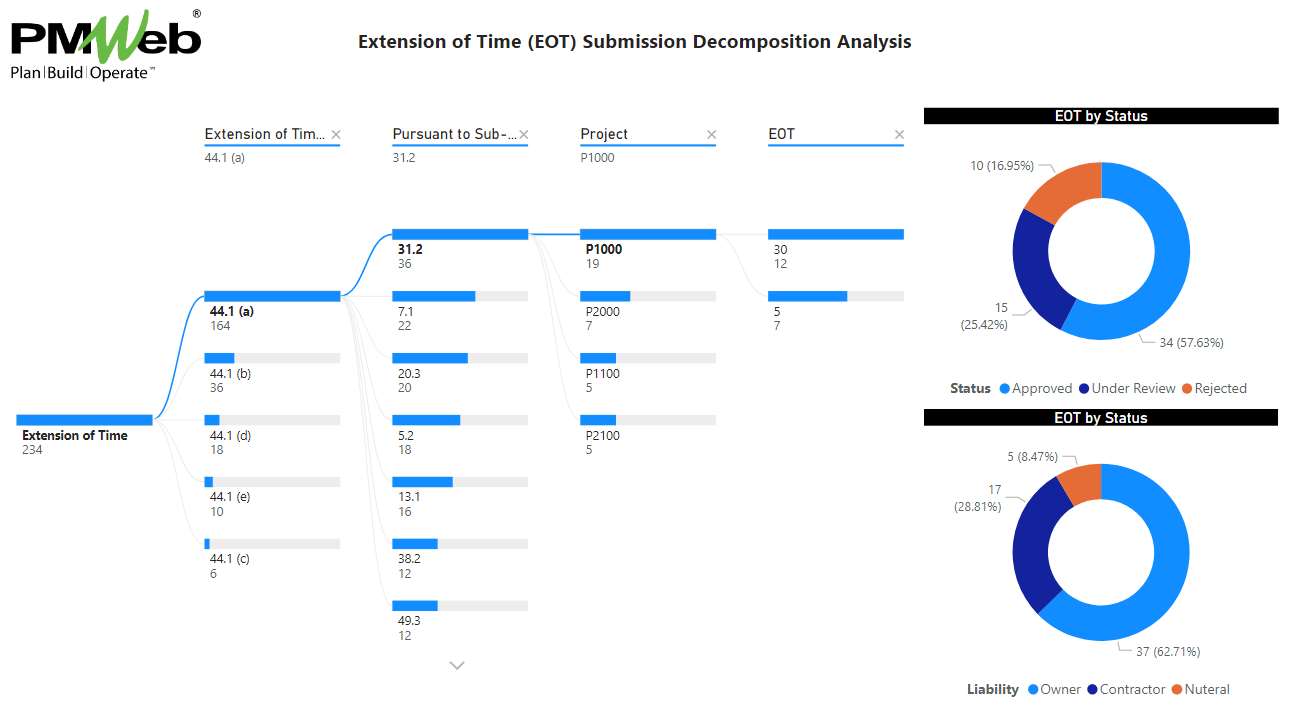
26. Specified project material is not substituted with lower quality material
When a contractor claims that he cannot submit the material that was originally specified in the original contract, it is recommended to have a Specification Comparison Form completed by the contractor to explain the particulars of the substitute material. This form will be created in PMWeb using the Custom Form Builder. All details of the originally specified material and the substitute needs to be attached to this form. The workflow then details the steps for submitting, reviewing, and approving this request.
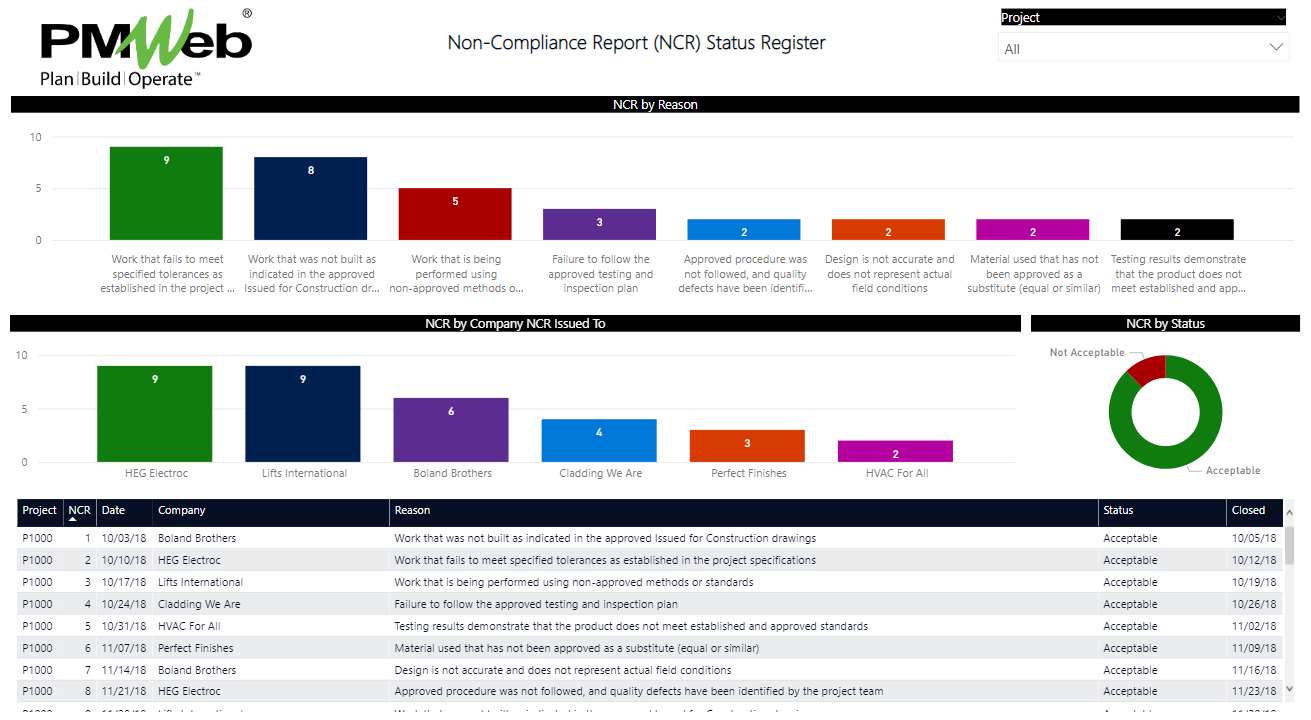
27. Credit for substituted material with lower cost is paid back to the project owner
Usually, the contractor provides credit for the substituted material which requires issuing a negative change order. The PMWeb change order module manages this process and links the change order to the Specification Comparison Form to provide the needed reference for this change order. The change order uses the agreed cost adjustments that are part of the Request for Alternative or Substitution form.
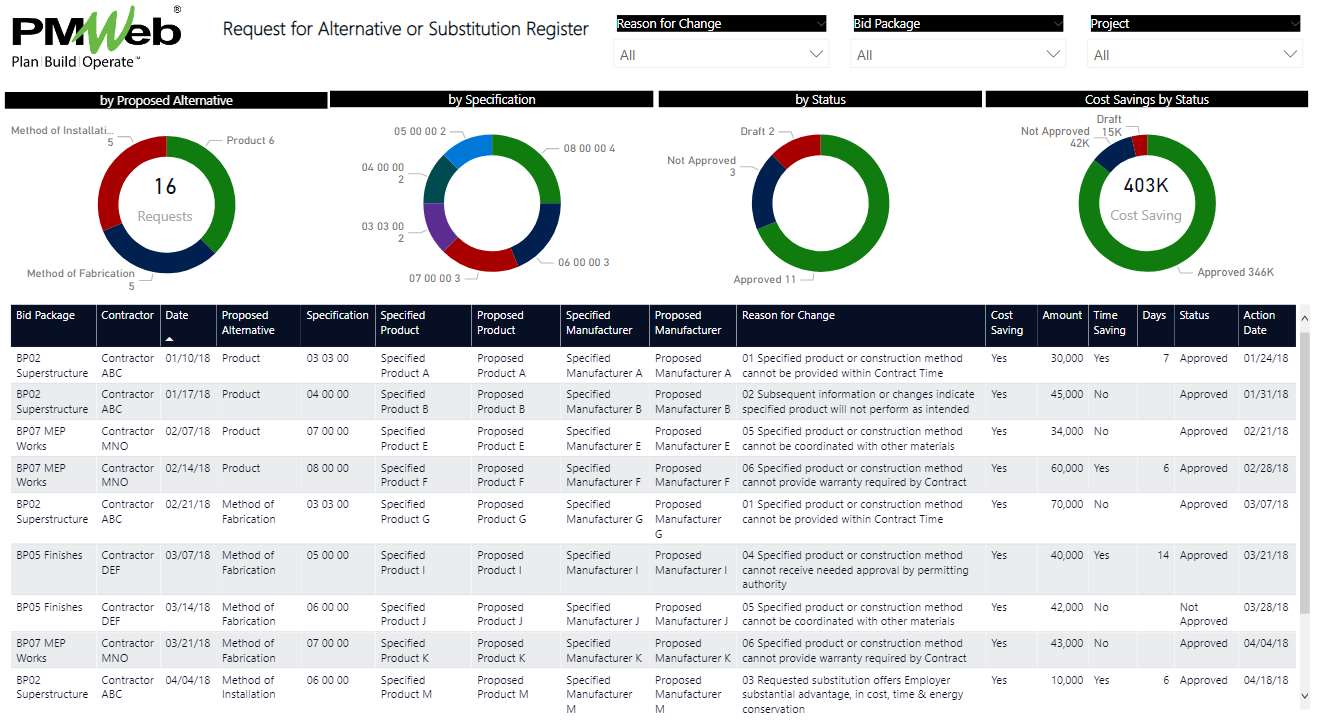
28. Snag lists/punch lists are completed and approved by the project consultant
PMWeb Snag List module prepares and ensures that all items included in the snag list have been rectified by the contractor. There is no limit on the number of snags that can be created, but they need to be explicit detailing the exact rectification needed and the location of the work. PMWeb allows creating a structured location breakdown structure to drag and drop the location details into the snag list register. The register also includes the date the rectification was requested and completed as well as the estimated cost of this rectification work, which deducts from the contractor’s contract value should they fail to complete the rectification works.
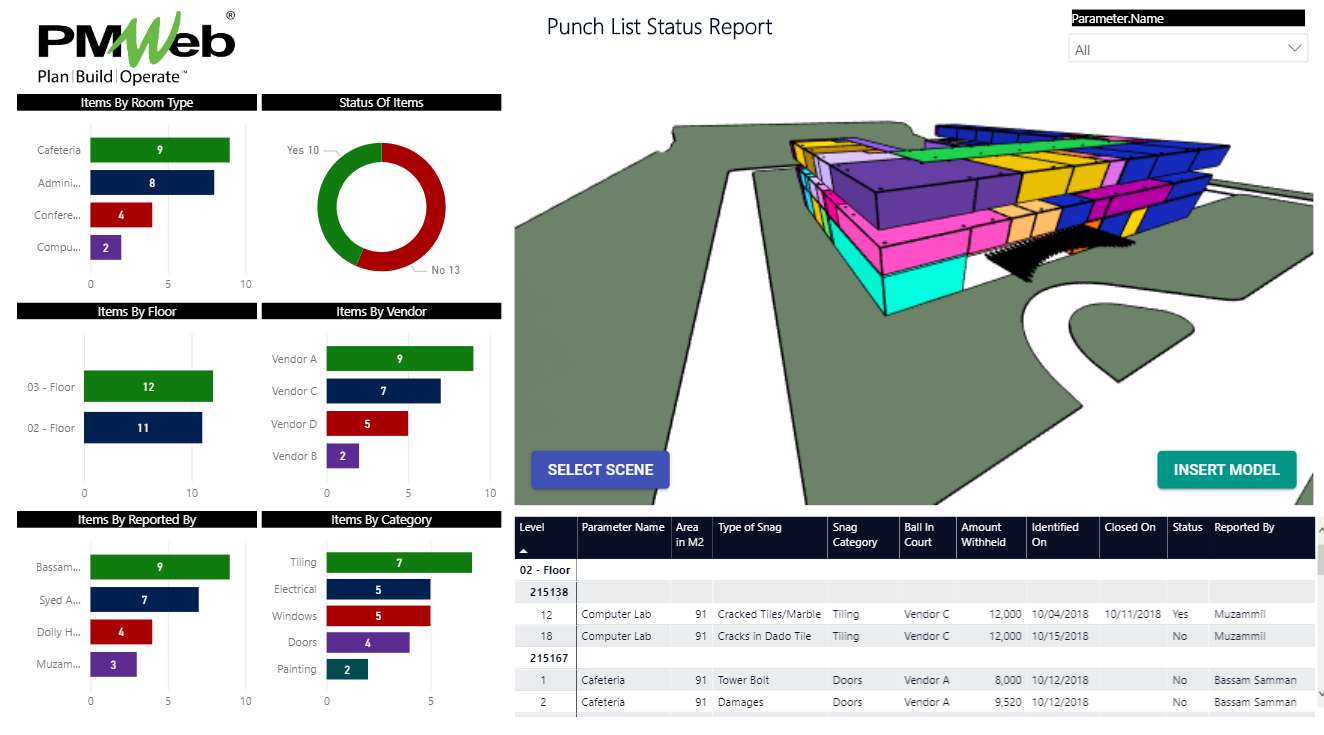
29. Proper and formal handover of completed works to the intended end-users
The PMWeb custom form builder and checklists can be used to create different handover documents for the project scope of work as the items to be checked for each scope of work could vary. In addition, the team members who could be involved in reviewing and approving the handover document could vary depending on the scope of work. These could include Hand Over of Close-Out Items for as-built Drawings, Warranties, Master keys, Salvaged Materials, Signed Defects List, Capital Items, Signed Snag List, Spare Parts, Special Tools, Testing & Commissioning, Training Manuals, Equipment, Completion Certificate, Substantial Acceptance, and Final Acceptance. Similar to all other modules in PMWeb, documents, pictures, videos, and specifications can be attached to the handover form.
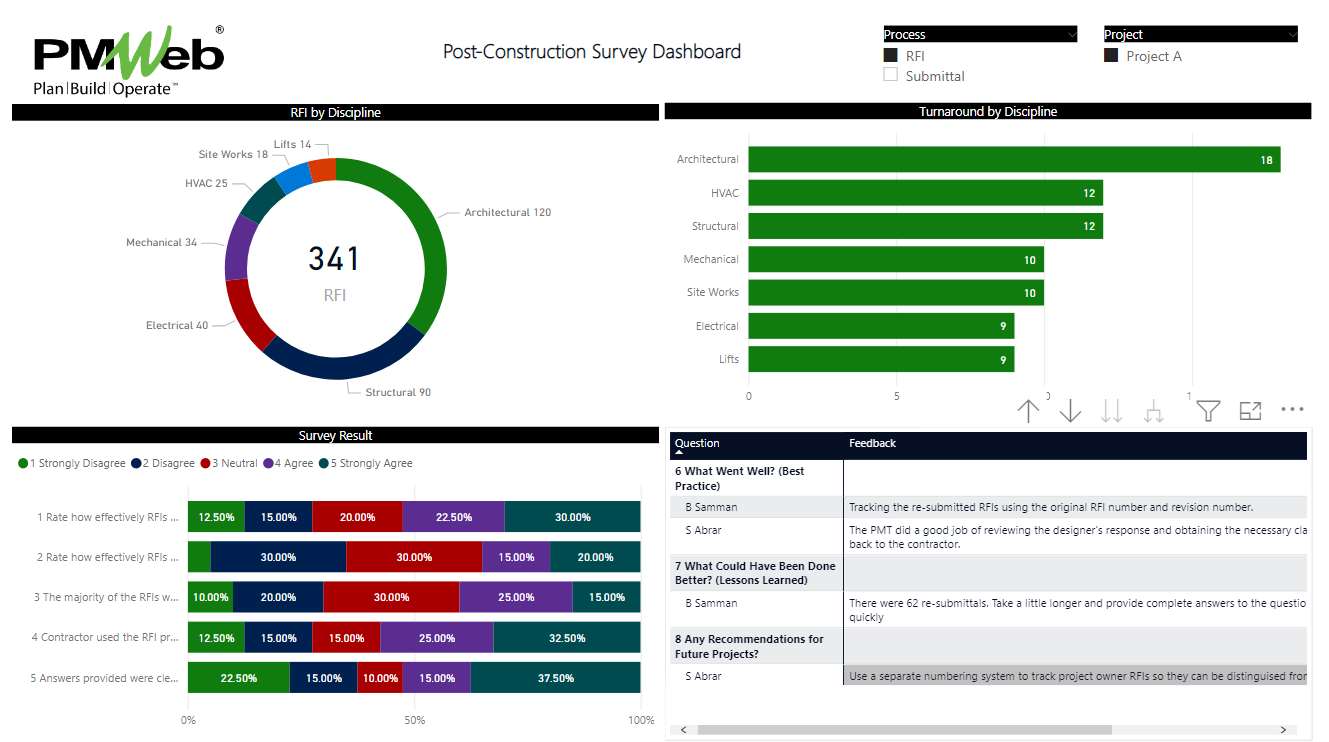
30. Lessons learned are captured to improve the organization’s knowledge management
The PMWeb custom form builder helps to develop the lessons learned template where it captures the detailed particulars of each lesson learned. Similar to all other custom forms, the lessons learned has attachments of all documents that are related to the lessons learned as well as linked to other PMWeb records that are relevant to the lessons learned. The workflow tracks the formal submittal, review and approval of the lessons learned.
